

County Farm Bureaus Honor Leading Agriculturists at Annual Banquets
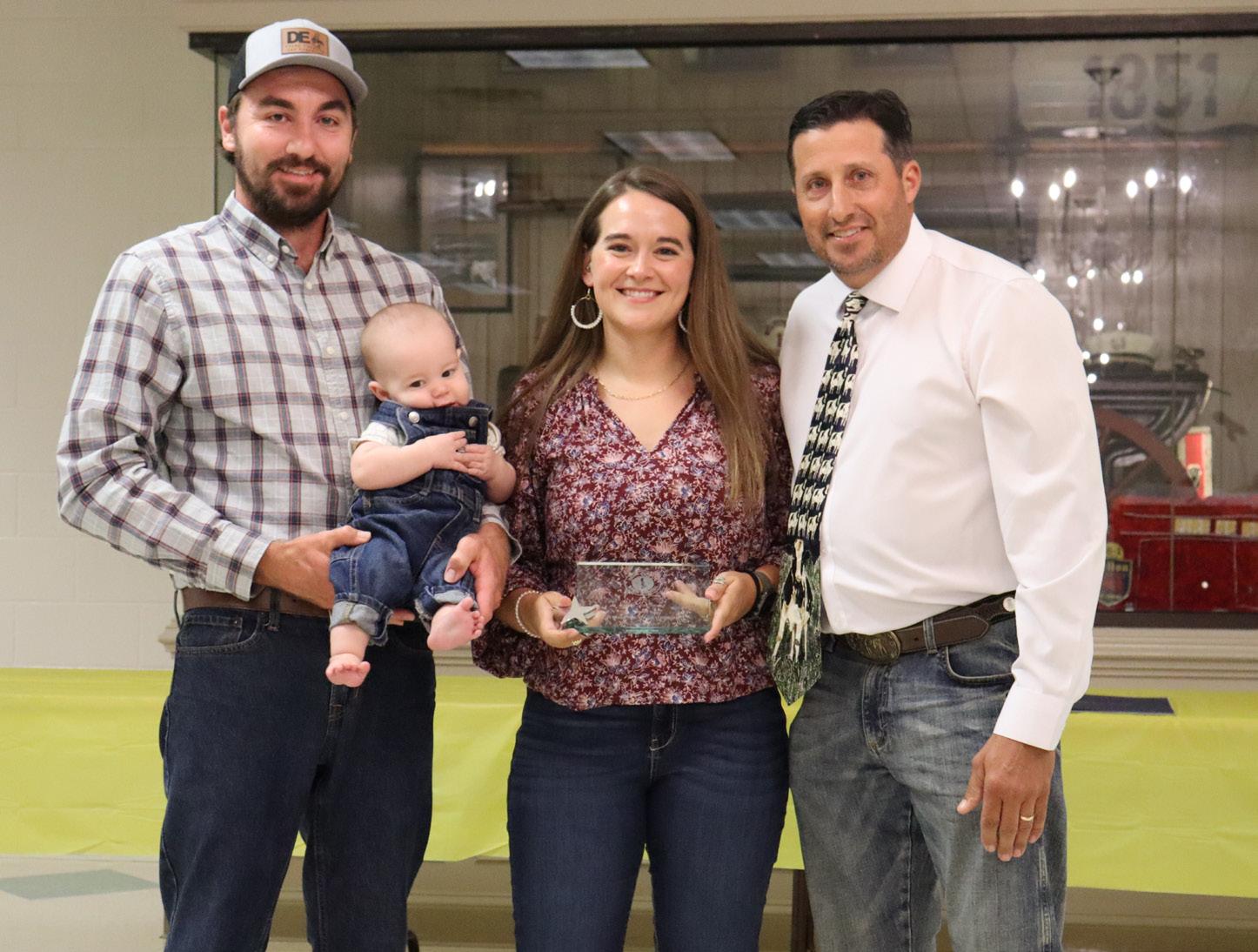
By Jaiden Cain Delaware Farm Bureau
County Farm Bureaus in Delaware proudly recognized outstanding individuals and families for their contributions to agriculture during their annual banquets. The events celebrated leadership, service, and innovation across the farming community.
Kent County Farm Bureau
Rising Star – Jordan and Casey Betts
Jordan and Casey Betts of Harrington received the Rising Star Award for their leadership and advocacy in agriculture. Active in the Young Farmers & Ranchers (YF&R) committee, Casey has served as Secretary and Vice Chair. Their involvement in YF&R also includes tractor pulls, strawberry festivals, and raffles. Casey completed the Corteva Agriscience Young Leader Program and works
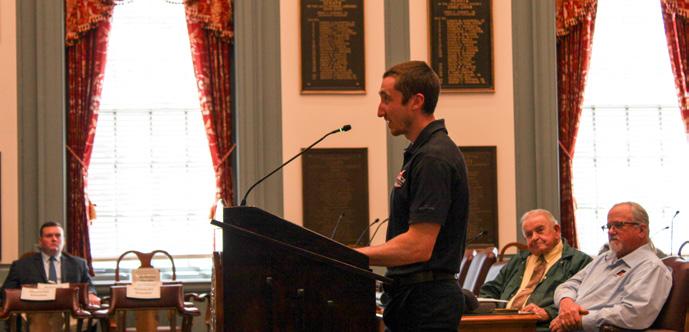

at Willard Agri-Service, while Jordan works on his family’s grain and poultry farm and is involved in the Big Stone Hunting Club. They are passionate about recruiting new YF&R members and supporting future agriculturists.
Distinguished Service to Agriculture – Donald Bullock
Donald Bullock of Harrington was honored for his lifelong dedication to agriculture through education, farming, and service. A former FFA State President and agriculture educator, Bullock taught agricultural education for over two decades and now serves as Seed Operations Manager at Nutrien Ag Solutions. His contributions include 30 years on the Delaware State Fair Board and extensive work in farming and seed sales.


From the President’s desk
Your Voice is Our Strength in Shaping Delaware Agriculture
Winter is approaching, and that means it’s almost time for Delaware Farm Bureau’s Annual Convention!

I’m thrilled to announce that we will be hosting a twoday convention for a second year, and we’ve worked hard to build on last year’s success. This year’s event will have a strong lineup of speakers and engaging activities.
We’ll be sharing updates through our social media channels, e-newsletters, and direct mail, so be sure to stay tuned for all the details.
The convention kicks off with our Annual Meeting of the Delegates, where representatives from each county meet to discuss and shape policy for Delaware Farm Bureau. If you’re interested in participating, please contact your County Farm Bureau President or reach out to our state office at 302-697-3183.
Policies discussed at our annual meeting guide us in our advocacy efforts throughout the year. Advocacy is at the heart of what we do at the Delaware Farm Bureau. We track legislation at the local, county, state, and federal levels, making sure farmers’ voices are heard loud and clear. While our
efforts touch all levels of government, we are most active at the state level.
The second half of Delaware’s 153rd General Assembly begins Tuesday, January 13, and we’re ready to keep the momentum going. Thanks to your engagement, we celebrated wins on x pieces of legislation last year. Your voice truly makes a difference!
Looking ahead to 2026, Senate Bill 35 is a top priority. This bill would allow counties to value agricultural structures like Farmland Assessment, providing much-needed property tax relief for farmers. We encourage you to continue mentioning this bill to your representatives in Dover. We also expect new legislation on energy and freshwater wet-
lands. DEFB is actively involved to ensure farmers and agriculture are included in the conversation from the very start.
Your participation is key. By reaching out to legislators and sharing your experiences, you help protect Delaware’s farms and rural communities. Together, we can build on our successes and advance policies that support farmers. Thank you for being an important part of our advocacy efforts, it really makes a difference!
It’s an honor to serve as an advocate for DEFB, and I’d love to help you get involved. Feel free to reach out to me, or to our Government Affairs Coordinator, Sydnie Grossnickle, at (302) 697-3183, to learn more.
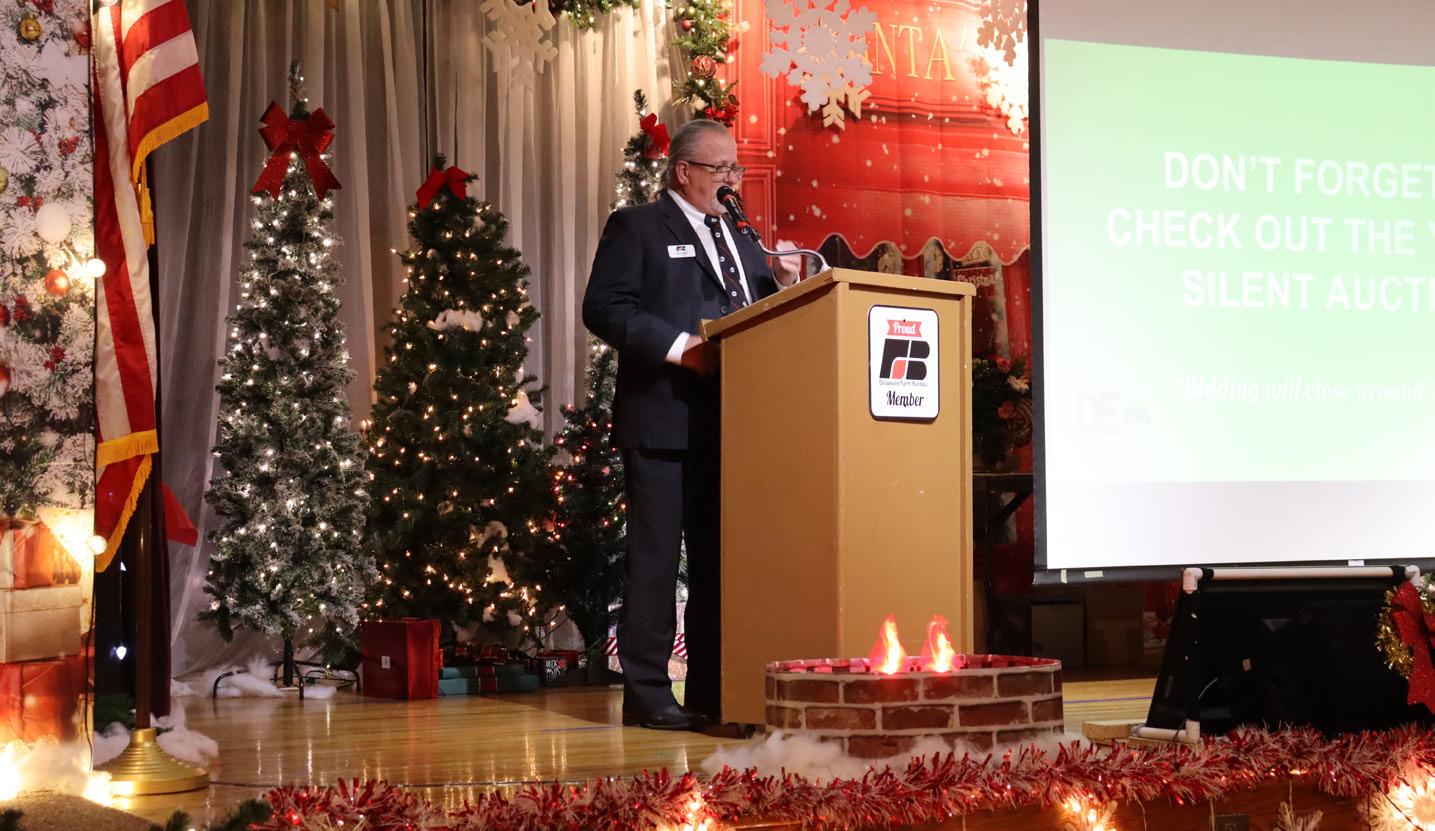


The Zipline Something for Everyone at the American Farm Bureau Convention
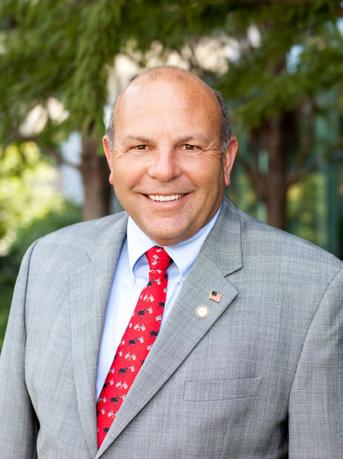
Registration is open for the 2026 American Farm Bureau Convention in Anaheim, California, January 9-14. This is our flagship event, and our team is pulling out all the stops to inspire farmers, ranchers and partners across agriculture to imagine, grow, and lead together in 2026. To help get you excited for all that we have in store, here’s a little preview.
Attendees can expect a robust lineup of workshops to learn together and explore ways to grow their businesses and leadership skills in 2026. Convention workshops will cover the top issues facing agriculture and the latest trends in member and consumer engagement. Come ready to hear about the hot public policy issues for 2026, get a preview of the economic outlook for agriculture, engage with leading agriculture topics in the MAHA era, learn more about mental health initiatives, and consider growth strategies for beginning farmers.
Beyond our workshop lineup, we also have special sessions throughout the weekend that give all attendees an opportunity to engage further and to sharpen their advocacy and storytelling skills. The Farm Bureau Women’s Leadership Committee will host its annual meeting on Sat., Jan. 10, which will feature an inspiring keynote from life coach and cattle rancher, Coach Kiah, as well as networking opportunities to help us kickoff the International Year of the Woman Farmer. The Promotion and Engagement Committee will host its annual Communicate, Collaborate and Influence (or CCI) training that same day, where they will explore strategies to engage with consumers. The Greenscreen Farmer, Jon
Dinsmore, will share his story and how he uses social media to engage with millions right from his farm. Attendees will have the opportunity to explore the “Power of Engagement” even more on Mon., Jan. 12, with a special workshop, where award-winning film and TV producer Sam Goldberg will bring his expertise to help attendees shape agricultural narratives that resonate with a variety of audiences.
We also are hoping for some of Southern California’s signature sunshine as we have a great lineup of local tours to offer attendees. Whether you are looking to see and sample local agriculture or get a behind-the-scenes look at historic California sites, we have got a tour for you. I also hear there’s a pretty famous mouse, who lives just a few blocks from the Convention Center, if you are looking to add in some family fun while you’re in California.
We’ve got all you could wish for when it comes to networking and learning about the latest innovation at our Trade Show. Stop by the new Ag Insights Hub where our sponsors and exhibitors will showcase their agriculture knowledge and share problem-solving strategies and helpful solutions. Our Cultivation Center Stage will feature an exciting lineup of speakers and maybe a live podcast or two—stay tuned for more there! And of course, the showcase event on the stage there will be the live Final Four round of the Ag Innovation Challenge. Come see what these innovative entrepreneurs have to offer your farm or ranch business. Then stop by our County Activities of Excellence booths to see the amazing programs our grassroots members have created to enrich and serve their communities. And don’t forget to stop by the AFBF booth where we’ll host a special Farm Bureau family gathering with picnic benches to foster fellowship. You can also step onto our front porch there to capture
photos with family and friends. Last, but certainly not least, we have an inspiring lineup for our general sessions. We have reimagined our main stage to bring renewed excitement to our time together as a Farm Bureau family. Before you head over to the opening general session, though, make sure you get a hearty helping of pancakes at the Ag Foundation’s Flapjack Fundraiser. You can enjoy a great meal and learn about the work our Ag Foundation team is doing to inspire the next generation to learn about agriculture. At our general sessions, we’ll honor those who have served agriculture and celebrate leaders who are imagining ways to grow and lead in agriculture. We’re excited to feature everyone’s favorite, again, the Farm Dog of the Year winner. We will honor our Veteran Farmer of the Year, and we’ll announce the winners of this year’s compet-
itive YF&R events. Then to close out our final general session, we’ll welcome special keynote speaker Tim Tebow.
Finally, I want to extend a special invitation to young leaders across agriculture and Farm Bureau. We will host a special Empowering Young Leaders Reception this year, and we hope this will encourage and inspire young leaders on their leadership journey as we celebrate them together. At Farm Bureau, we know our future is only as strong as the leaders we are empowering today.
I hope this preview has you excited for the 2026 AFBF Convention and inspires you to register today. Whether you are still making plans or already packing your bags, I invite you to check out more details and exciting announcements on our convention website. We’ll see you in Anaheim!

Catching up with the Counties Farming Under Pressure in New Castle County and Across Delaware
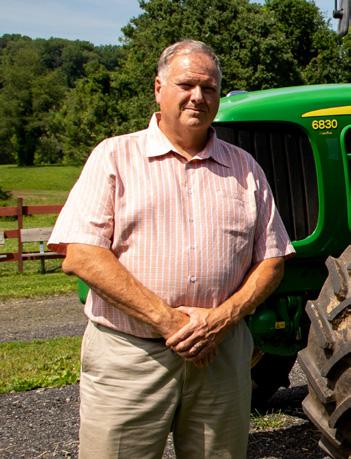
We are currently in challenging times for agriculture. Depressed commodity prices driven by global oversupply, strong international competition, tariffs, and an abundance of good crops are putting immense pressure on farmers.
In today’s environment, average is not enough. To survive, farmers must be in the top 25% in terms of yield while maintaining moderate production costs. Success requires strategic decisions: using manure and commercial fertilizers wisely, expert marketing, irrigation, delaying major equipment purchases like combines and tractors, and re-
COUNTY AWARDS
CONTINUED FROM PAGE 1
Farm Family of the Year – The David Marvel Jr. Family
The Marvel family of Harrington was named Farm Family of the Year for their multi-generational commitment to growing fruits, vegetables, and grains. David Marvel Jr. has balanced off-farm work with sustaining the family farm and helping develop the Delaware Farm to
lying on crop insurance for disaster protection. However, crop insurance alone cannot sustain average or below-average operations.
Some farmers turn to intensification by building poultry houses, investing in value-added production or processing, or increasing irrigation. However, these efforts require significant capital, and with today’s elevated interest rates and increased taxes on structures, many of these projects are out of reach. Other farmers explore value-added activities such as pickyour-own operations, local production, branded products, and farm-based experiences. Agritourism, though, is not for everyone and comes with its own unique risks and challenges.
In 1650, 95% of the population farmed, today less than 5% farm. In 1800 the average farmer produced enough food for 3 to 5 peo-
School Program. His advocacy has earned state and national recognition, including the Governor’s Outstanding Volunteer Award.
New Castle County Farm Bure-
au
Rising Star – Robbie & Emily Emerson
Robbie and Emily Emerson were recognized for their leadership and dedication to agriculture. Robbie, raised in Farm Bureau, serves on
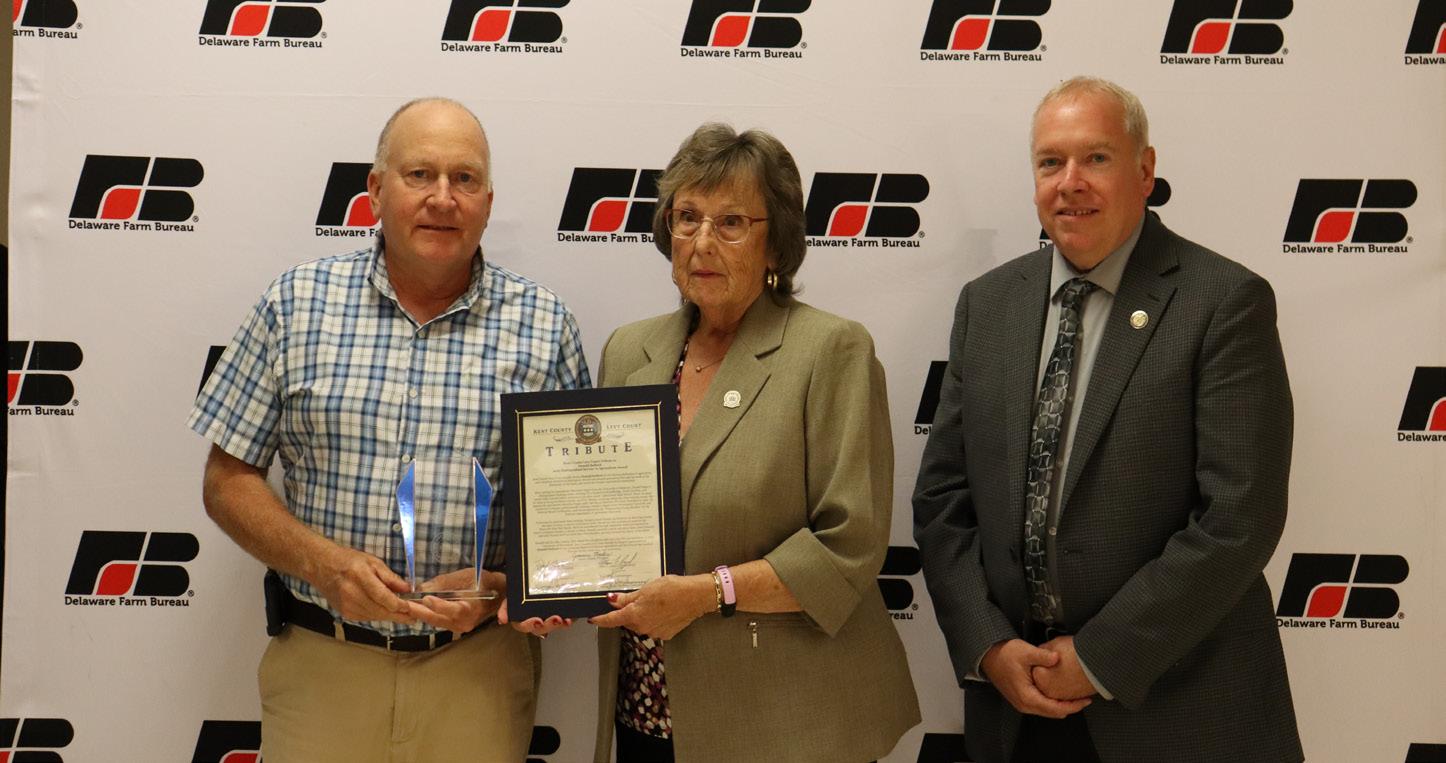
ple, today we feed 170 people. A lot has changed for our farmers. Historically, agriculture has been the backbone of our communities and many of our legislators either came from a farm or were a generation removed. Today this is much less common, Farm Bureau works to fill that information gap and be a resource to policy makers with respect to farmers’ needs. Farmers’ needs are truly special and different!
One of my favorite things about Farm Bureau is that it brings together farmers of all shapes and sizes. Just within New Castle County, we have farm families who have been farming on their land since the 1600s, alongside passionate first-generation farmers. Some manage thousands of acres, while others grow on less than one. Our membership includes grain farmers, livestock producers, veg-
multiple agricultural boards and supports FFA, 4-H, and college students through innovative and sustainable farming. Emily teaches agriculture and is an FFA advisor at William Penn High School, actively promoting the agriculture industry. Together, they raise dairy heifers, beef cattle, and crops on their family farm.
Distinguished Service to Agriculture – Tim McCardell
etable growers, those employed in agriculture, and farm community members; anyone deeply committed to preserving and supporting the agricultural way of life.
Last year, we worked to pass a bill that gives farmers a break on their crop insurance premiums. This helped farmers be able to increase their protection at the same or similar prices. This year, we are working to pass Senate Bill 35 which would make agricultural structures tax exempt. This would help combat the large increases many farmers saw in their taxes due to the reassessment, especially in New Castle County. For the first time in decades, New Castle County reassessed property values. The update, which was ordered by the chancery court to fix school funding inequalities, is to
NEW CASTLE COUNTY
CONTINUED TO PAGE 15
Tim McCardell received the Distinguished Service Award for his lifelong support of Delaware farmers. Raised on a family dairy farm, Tim’s passion for agriculture led him to Penn State University and later to Agway and UAP (now Nutrien), building strong relationships with New Castle County farmers. In 2000, he founded Delcarm, providing fertilizer, crop
CONTINUED TO PAGE 5
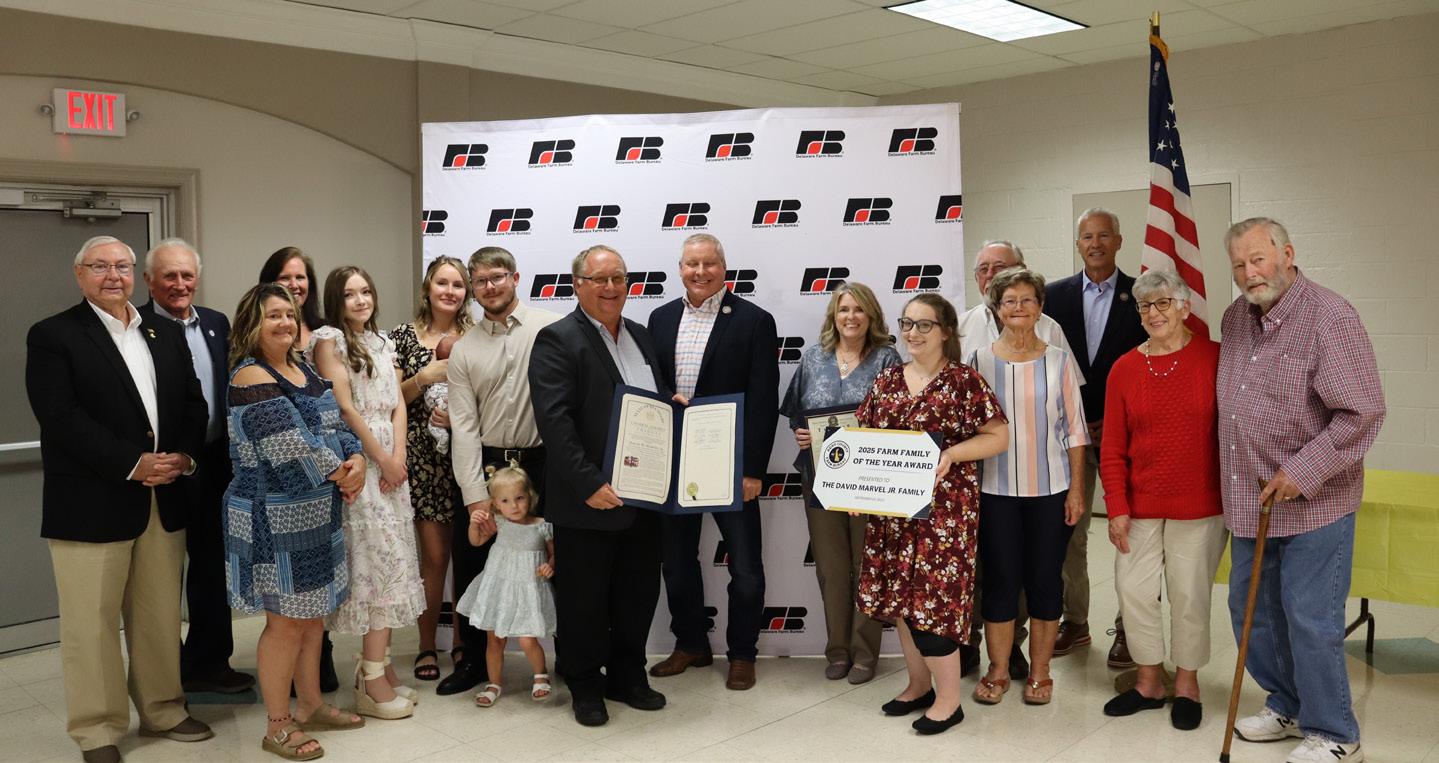
FROM PAGE 4
protection, and seed services to Middletown-area farms.
Farm Family of the Year – The Jeff Bartsch Family
The Jeff Bartsch family of New Castle County was honored for their long-standing commitment to farming. Jeff Bartsch has spent over 25 years promoting agricultural conservation through his exca-
vating business and long-standing partnerships with the New Castle Conservation District. The family is known for mentoring young farmers, lending equipment to neighbors, and encouraging non-farmers to get involved in agriculture. They are stewards of the land, embracing soil health, cover crops, and sustainable practices.
Sussex County Farm Bureau Distinguished Service to Agricul-
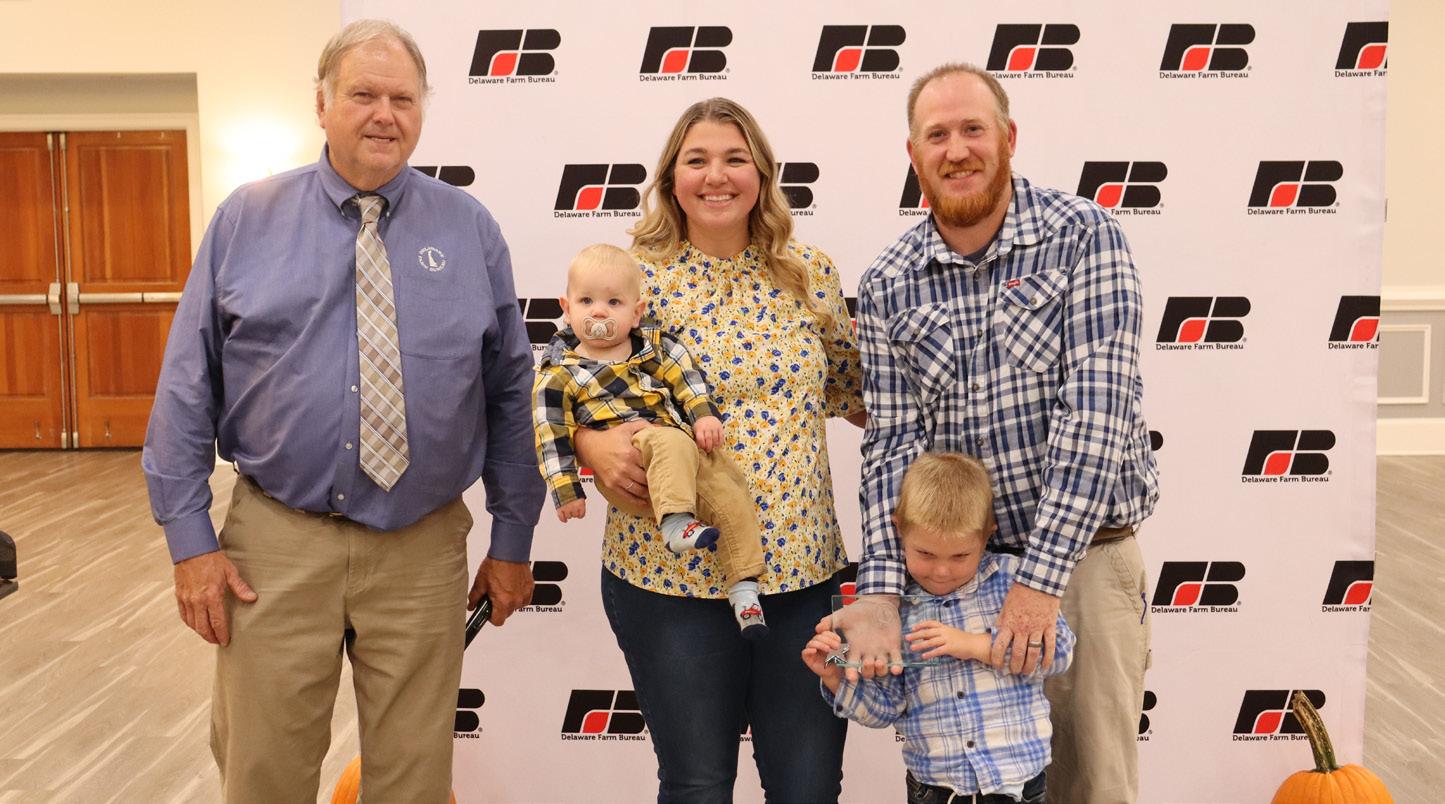
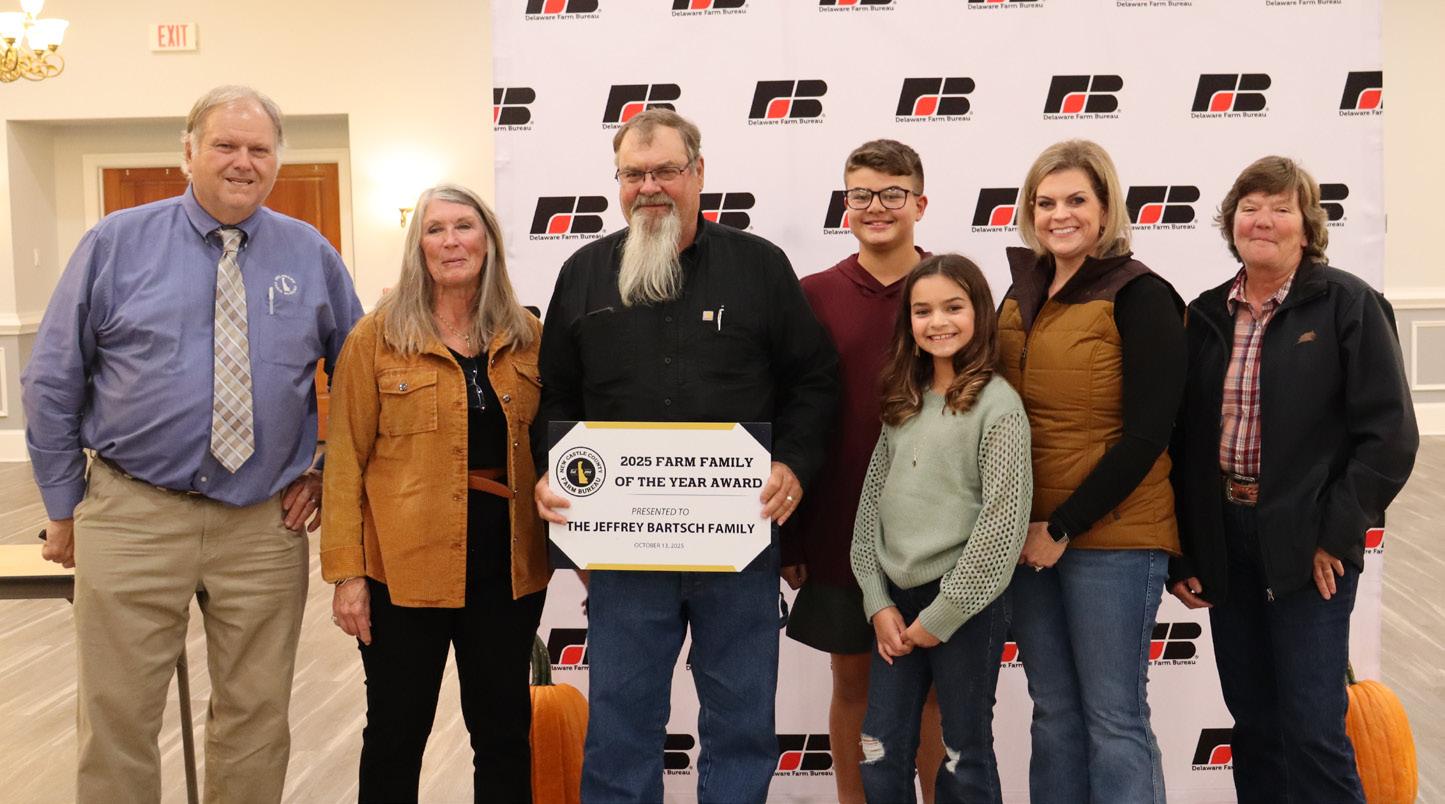
ture & Farm Family of the Year –
The Richard Wilkins Family
Sussex County Farm Bureau honored the late Richard Wilkins and his family with two awards for their lasting contributions to Delaware agriculture. Richard operated B&W Ag Enterprises, farmed in Kent and Sussex Counties, and managed a 120-head beef herd. In 2025, he was appointed State Executive Director of the USDA Farm Service Agency in Delaware
and held national leadership roles with the American Soybean Association.
A former Kent County and State Farm Bureau President, Richard was a strong advocate for agricultural policy and mentorship. His legacy continues through the support of his wife, Donna, and their family, who embody the values of hard work, unity, and service that define Delaware’s agricultural community.
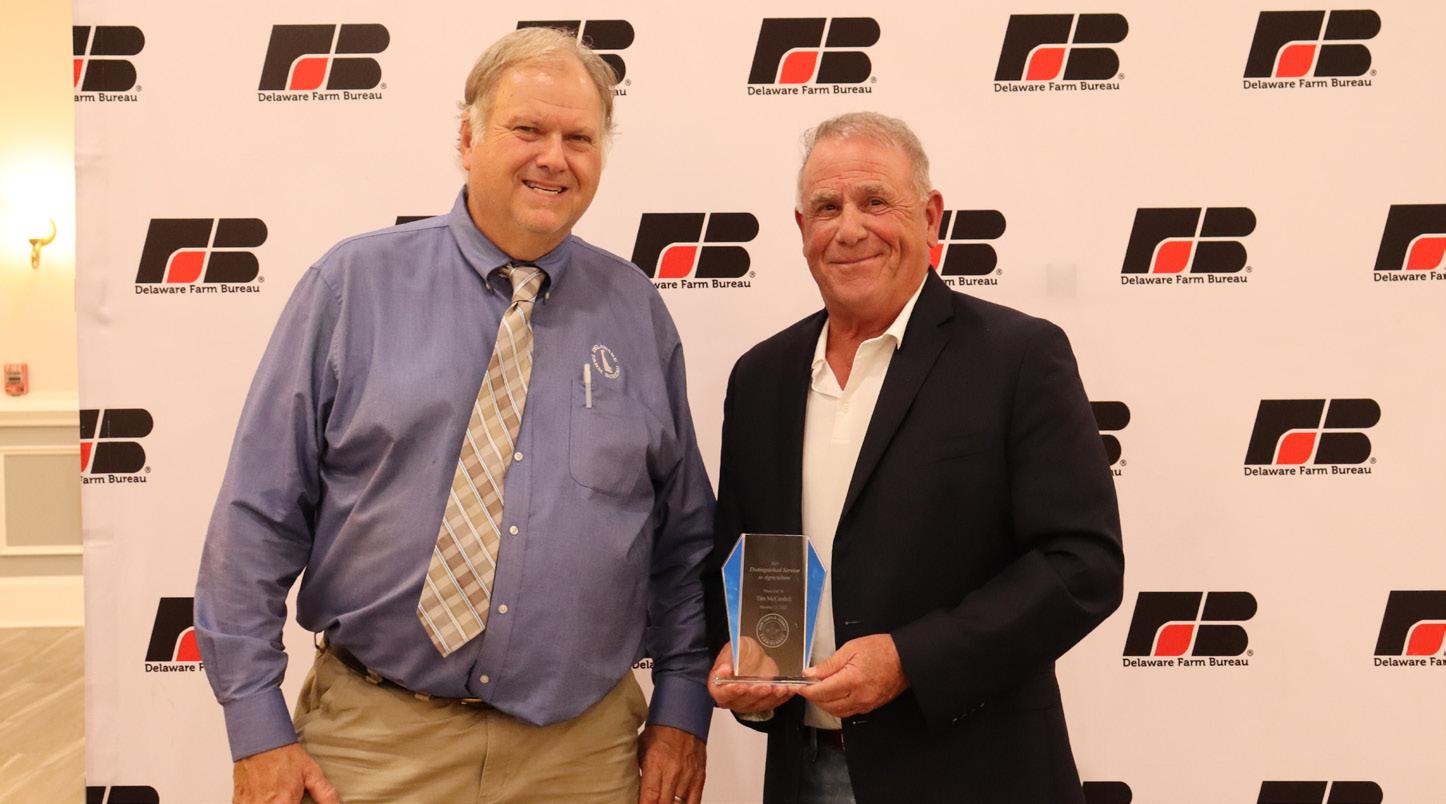


Government Affairs 2026 State Legislative Preview

Sydnie Grossnickle DEFB Government Affairs Coordinator
2026 is looking to be a highstakes year for Delaware legislation. From tax and energy reforms to wetland protections and property reassessment, legislators are expected to introduce a series of legislation, some flashy, some critical, all while keeping an eye on the upcoming elections. DEFB will be on the front lines, monitoring developments, advocating for agriculture, and making sure our members’ voices are heard in every debate and decision. Several bills that were not completed in 2025 are expected to move forward in 2026.
Key Bills to Watch
Senate Bill 35
SB 35 would allow counties to apply the same assessment mechanism used for farmland to agricultural structures, potentially providing much-needed property tax relief for the producers. The bill advanced quickly through the Senate Ag Committee and is currently awaiting consideration in Senate Finance. DEFB is confident that SB 35 will see action in 2026, but we continue to encourage members and supporters to contact their elected officials and emphasize the importance of this legislation for Delaware agriculture.
House Bill 176
HB 176 revisits the Right to Repair issue, this time with a specific focus on agricultural equipment, unlike the broader 2021 bill introduced by former Rep. Ruth Briggs King. As currently drafted, the bill conflicts with existing agreements between the American Farm Bureau Federation and major equipment manufacturers, leading DEFB to oppose it in its current form. DEFB is actively collaborating with prime sponsor Rep.
Rich Collins (R-S), manufacturers, and dealers to develop a workable solution, and we expect the bill to be considered at the first House Ag Committee meeting of the session.
House Substitute 1 for HB 181
HS 1 for HB 181 amends the Family and Medical Paid Leave Insurance Program by postponing certain penalties under the program until January 1, 2027. DEFB submitted comments in support of this legislation. The bill has been released from the House Labor Committee and is currently on the House Ready List for consideration in 2026.
House Bill 221
HB 221, endorsed by the Delaware Department of Ag, would allow the Department to increase the biennial pesticide registration fee from its current maximum of $140 up to $500. This does not automatically mean the fee will rise to $500, instead, it provides the Department with flexibility to adjust fees within that range. The bill was walked through the House Ag Committee and is currently on the House Ready List for consideration when the session reconvenes in January. DEFB has not yet taken a position on the legislation but will continue to monitor its progress closely.
House Bill 222
HB 222 amends the Delaware Code related to the Nutrient Management Program by increasing the fine range for violations from $25 - $1,000 to $125 - $5,000 per violation. The bill passed the House, but rather than being referred to the Senate Ag Committee, it was walked through the Senate Executive Committee. As part of the Bond Bill dealings on June 30, Senate Republicans ensured that HB 222 remained on the Senate Ready List, and it did not receive floor consideration in 2025. Discussions on the legislation are ongoing, and DEFB will continue to keep members informed on its status.
House Bill 235
HB 235 would allow the composting of yard waste, food residuals, and other organic materials on property zoned for agricultural use. The legislation was filed on June 30 and is expected to be considered by the House Ag Committee in 2026. DEFB has not yet taken a position on the bill but will continue to monitor its progress.
Issues on the Horizon Energy
Energy legislation is expected to be a major focus in Delaware’s 2026 legislative session. While 2025 bills laid the groundwork for long-term energy reform, many still need follow-up through regulations, funding, and implementation. Rising energy costs and consumer concerns are pushing legislators to address rate hikes, transparency, and assistance programs. Key topics likely include offshore wind development, rate structures for large energy users (HB 233), net-metering updates, utility oversight, and energy storage initiatives. Legislators may also explore new assistance programs, grid reliability through advanced technologies like small modular reactors, and greater
transparency from the Public Service Commission and Energize DE, all while balancing the state’s clean energy goals with fairness in who pays for the transition.
Freshwater Wetlands
Delaware legislators are expected to take another look at freshwater wetlands legislation during the 2026 session. In 2024, SB 290 proposed creating a state-run permitting program for nontidal wetlands under DNREC to fill gaps left by changes in federal rules. While the bill didn’t advance, the discussion is far from over. Many environmental groups continue to push for stronger wetland protections, while stakeholders have raised concerns about added regulations, permitting delays, and uncertainty over what areas would be classified as wetlands. DEFB has been active during working group conversations and will be watching closely to ensure any new rules do not place unnecessary burdens on farmers and private landowners.
Reassessment
DEFB anticipates that property reassessment will remain a major focus in 2026. During the Special
LEGISLATIVE PREVIEW CONTINUED TO PAGE 20
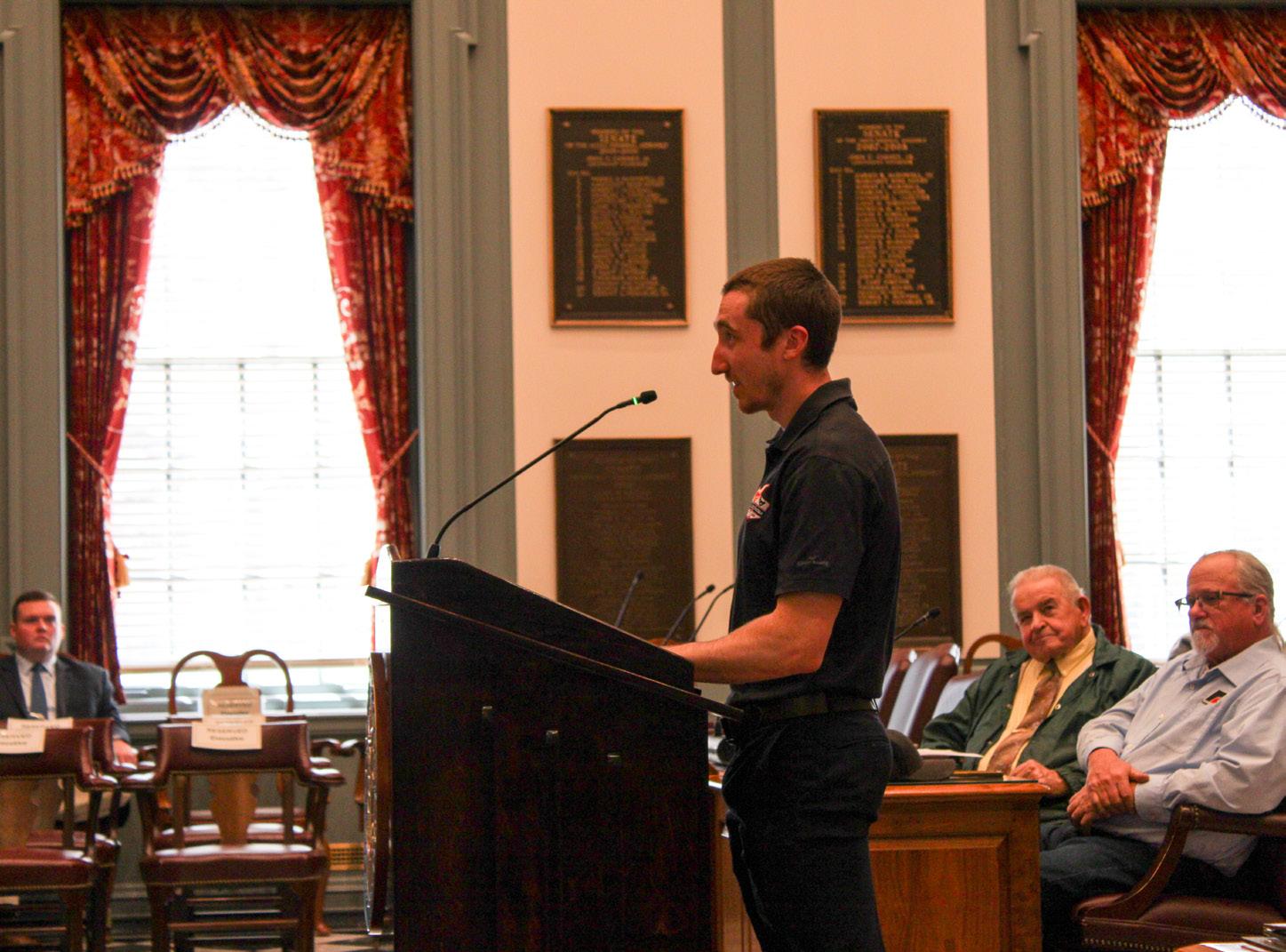
Committee Corner
The YF&R to Hold Annual Silent Auction and Discussion Meet at DEFB Convention
As the harvest season comes to a close and we begin to look forward to and prepare for the coming holiday season, we count our many blessings, including the birth of our Savior Jesus Christ.

Sydniey Thompson DE YF&R Secretary
The Delaware Young Farmers and Ranchers are preparing for something special too: Our annual silent auction held on December 13th at the Delaware Farm Bureau State Banquet. We are currently seeking and collecting donations for the silent auction. This is where you come in! When you donate to our silent auction, you are supporting the next generation of agriculture. You are giving us the ability to further our education in leadership skills and topics that are important in agriculture today, the ability to
serve our local community, and so much more! Not to mention that it gives you the opportunity to promote your farm and business.
We appreciate your continued support and thank you for your consideration. We could not do this without you!
In addition to the silent auction, the Delaware Young Farmers and Ranchers are excited to host our Discussion Meet Competition. This special event will take place on the morning of Saturday, December 13th at the Modern Maturity Center—the same welcoming venue where our banquet will be held later that evening.
This opportunity is open to Delaware Farm Bureau members between the ages of 18 and 35 as of January 1, 2026. Those currently pursuing collegiate studies are invited to participate in the Collegiate Division, while all others may join the General Division.
The Discussion Meet is more than just a contest; it’s a chance to come together and thoughtfully ex-
plore the challenges facing agriculture today. Participants will engage in meaningful conversations, share ideas, and work toward solutions in a format that encourages collaboration, leadership, and growth. It’s a celebration of the voices shaping the future of farming.
Winners of the competition will go on to represent Delaware on the national stage, either at the American Farm Bureau Convention in Anaheim, California this January,
or at the Young Farmers & Ranchers Leadership Conference in Portland, Oregon this March. Both trips are generously sponsored by Delaware Farm Bureau and the Delaware Young Farmers and Ranchers.
If you’d like to learn more about the silent auction or the Discussion Meet, we welcome you to reach out to a local YF&R member, call the DEFB State Office at 302-6973183, or contact Sydnie Grossnickle, YF&R Coordinator.

Thank a Farmer this Holiday Season
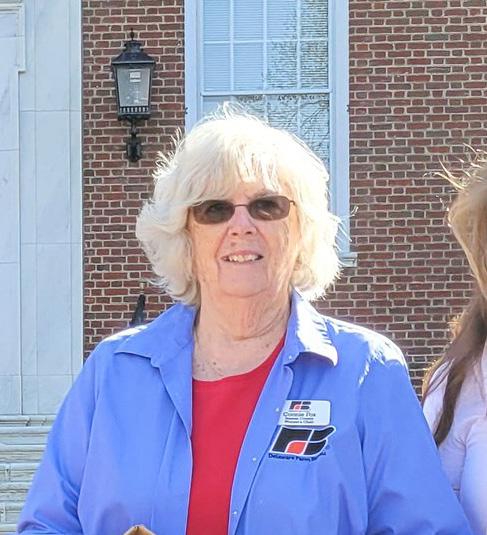
Connie Fox P&E Committee Member
November and December are some of the busiest months of the year, especially for our hardworking farmers. As the season winds down, they’re out in the fields harvesting the last of their crops, winterizing equipment, and preparing for colder days ahead. And for those caring for livestock, the work never truly stops as animals need tending no matter the season.
Thanksgiving brings with it cherished traditions: turkey, mashed potatoes, stuffing, cranberries, vegetables, and sweet treats. And so much of that delicious bounty is grown right here in Delaware! While turkey farms may be fewer than chicken farms, they’re still part of our agri-
cultural landscape. Our local farmers also grow potatoes, corn, string beans, lima beans, peas, and a variety of fruits and vegetables that often find their way onto your holiday dinner plate.
According to the American Farm Bureau Federation’s 2024 Thanksgiving Cost Survey, a meal for ten people can average $58.08 for a family of 10—but those with home gardens may be fortunate enough to harvest their own produce. This year, the DEFB Promotion & Education (P&E) Committee is teaming up with the Women’s Committee to help fill 14,000 boxes in just four hours at Mountaire’s annual Thanksgiving for Thousands event. For more than 30 years, Mountaire employees and hundreds of volunteers have come together to share the spirit of the season, delivering ready-tocook meals to over 150,000 people. Each box is thoughtfully packed with a Mountaire roaster, stuffing, vegetables, cranberries, gravy, and
dessert—a true labor of love and a powerful reminder of what community can accomplish.
Then comes Christmas. Have you ever wandered through a tree farm, breathing in the fresh scent of evergreens while searching for the perfect tree? Years ago, it was tradition to “green” the house a few days before Christmas—decorating with holly, mistletoe, and fresh greenery throughout the home. The mingling
scents of pine and baking cookies created a kind of magic that lingered in the air. There’s truly nothing like the smell of Christmas.
So when you see a farmer this season, take a moment to thank them— for the food on your table, the scents that fill your home, and the beauty that surrounds us. Without our farmers, so much of what we treasure simply wouldn’t be possible.
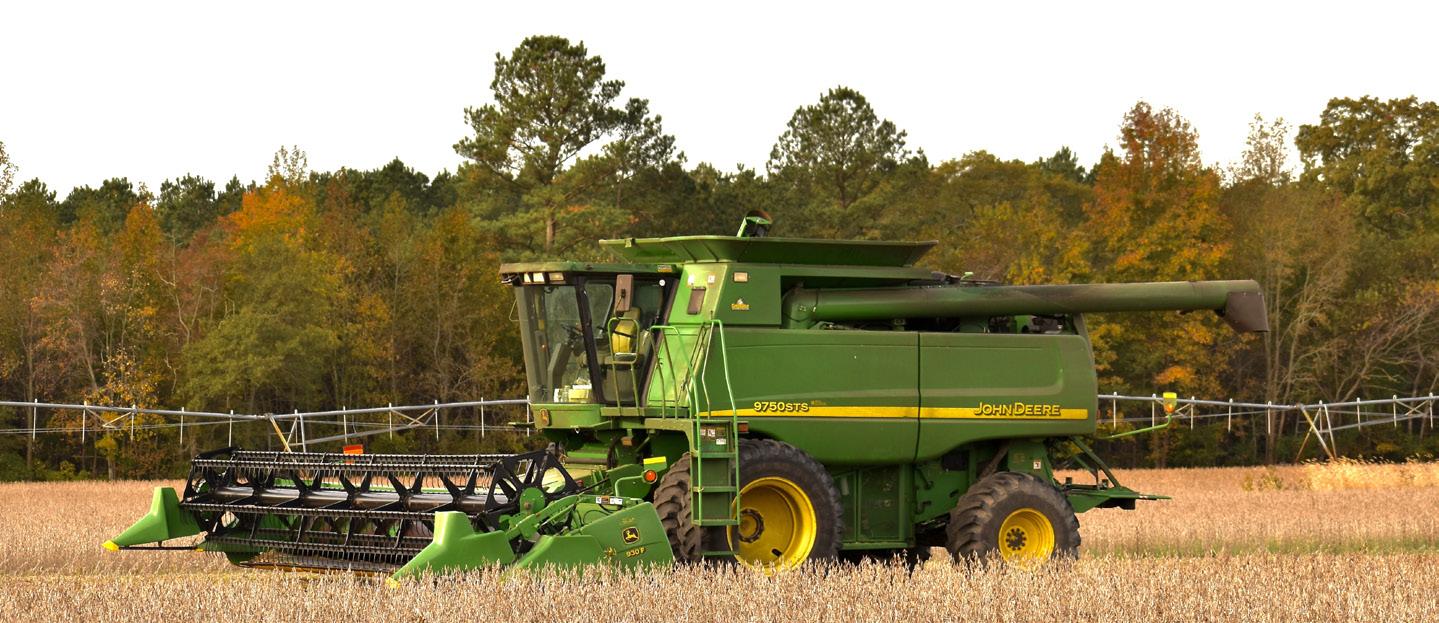
DEFB Women’s Committee to Honor Veterans Through Wreaths Across America
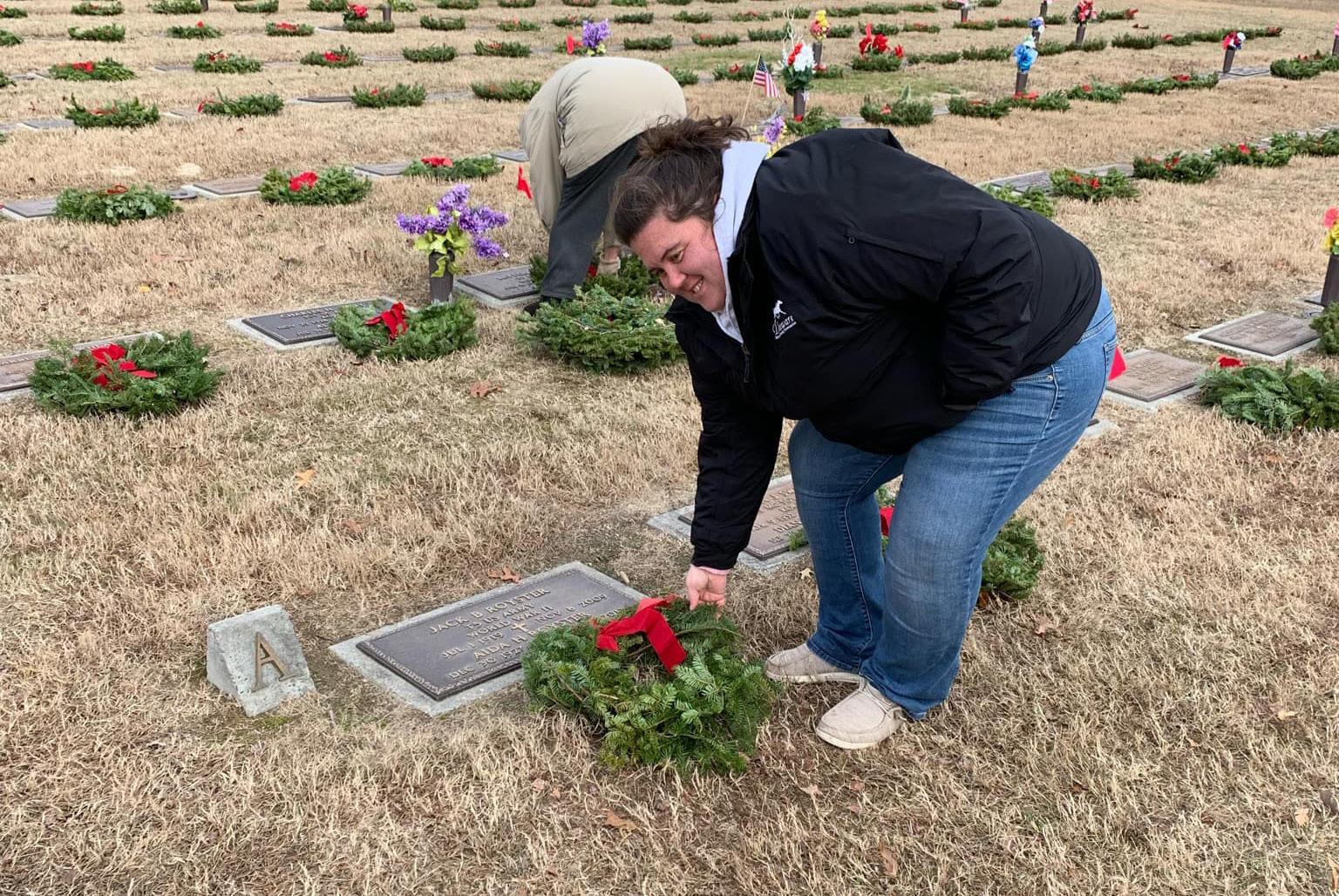
The Delaware Farm Bureau Women’s Committee is proud to once again participate in the national Wreaths Across America program this year. This initiative honors veterans by placing wreaths on their graves during the holiday season.
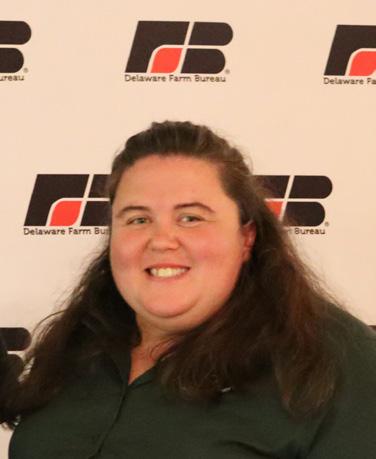
The committee is asking individuals to sponsor wreaths through Wreaths Across America. Each wreath can be dedicated in memory of a specific veteran, in honor of a living veteran, or sponsored for gen-
eral placement. This is a heartfelt way to show appreciation for the sacrifices made by our service members.
On Saturday, December 13, members of the Women’s Committee will volunteer at the Delaware Veterans Memorial Cemetery in Millsboro to lay wreaths and pay tribute to those who served.
Wreaths are available for $17.00 and can be purchased at wreathsacrossamerica.org. Use the code DE0079P at checkout to support the DEFB Women’s Committee.
If you would like to join the committee in volunteering on National Wreaths Across America Day, please contact myself, State Women’s Committee Chair Mollie Lynch, or reach out to the DEFB State Office at 302-697-3183.
Nominations Open for Golden Owl Award, Honoring Outstanding Delaware Agricultural Educators
Do you know an agricultural educator who goes above and beyond for their students, school, and community? Now is your chance to recognize their impact!
The Golden Owl Award®, sponsored by Nationwide Insurance and the Delaware FFA Association, celebrates the dedication, passion, and leadership of Delaware’s agricultural teachers.
The Golden Owl Award is designed to honor educators who not only teach essential skills in the classroom but also inspire and mentor the next generation of agricultural leaders. These educators play a vital role in strengthening the future of farming, agribusiness, and community leadership across the First State.
How it works:
• Students, parents, fellow teachers, FFA members, or community supporters can nominate a deserving teacher.
• Finalists will each receive a $500 prize and an engraved plaque.
• · One grand prize winner will be chosen as Delaware’s Agricultural Educator of the Year, receiving the Golden Owl Award trophy and $3,000.
• Additionally, Nationwide Insurance will donate $5,000 to the Delaware FFA Association to support leadership and educational programs that help students thrive.
“Agricultural education is the backbone of our mission in FFA,” said Trey Thompson, executive secretary of the Delaware FFA Association. “The Golden Owl Award gives us the opportunity to spotlight the incredible teachers who dedicate countless hours to preparing students for careers and leadership in agriculture.”
How to Nominate:
• Nominations can be submitted online through Nov. 15.
For more information about the Golden Owl Award, please contact: Trey Thompson, Delaware FFA Association
Trey.thompson2@dela-

Delaware Farm Bureau 2026 Summer Internship Applications Open
By: Mikayla Paul Delaware Farm Bureau
The Delaware Farm Bureau (DEFB) is now accepting applications for its 2026 summer internship program. College students interested in gaining hands-on experience in agriculture while developing their advocacy and leadership skills are encouraged to apply by January 31st, 2026.
“During my internship with the Delaware Farm Bureau, I had the opportunity to collaborate with dedicated professionals, develop valuable lifelong skills, and gain hands on experience in classroom settings, agricultural operations across the state, and at Legislative Hall,” shares 2025 summer intern Emerson Hickey. “This experience has provided me with lasting knowledge and memories that will continue to influence my personal and professional growth.”
During her internship, Hickey collaborated with the other 2025 summer interns to enhance DEFB’s public image and boost awareness and engagement among its members.
The 2025 summer interns were
instrumental in helping the DEFB Promotion & Education (P&E) Committee launch their Stories from the Field podcast, which shares real stories from Delaware’s farming community. Interns also monitored and managed DEFB’s social media platforms, producing content that showcased and promoted agriculture.
Applicants should be an undergraduate student pursuing a bachelor’s degree in marketing/business, education, or agriculture. Proficiency in digital media platforms, photography, videography, and Microsoft applications are preferred. Candidates should also be comfortable with public speaking and willing to travel statewide for social media content creation and agricultural outreach.
To apply, submit a resume, cover letter, and one letter of recommendation from a professor or previous employer to Mikayla.paul@defb.org by January 31st, 2026.
For more information on the 2026 DEFB summer internship program, visit https://defb.org/internship-program/.

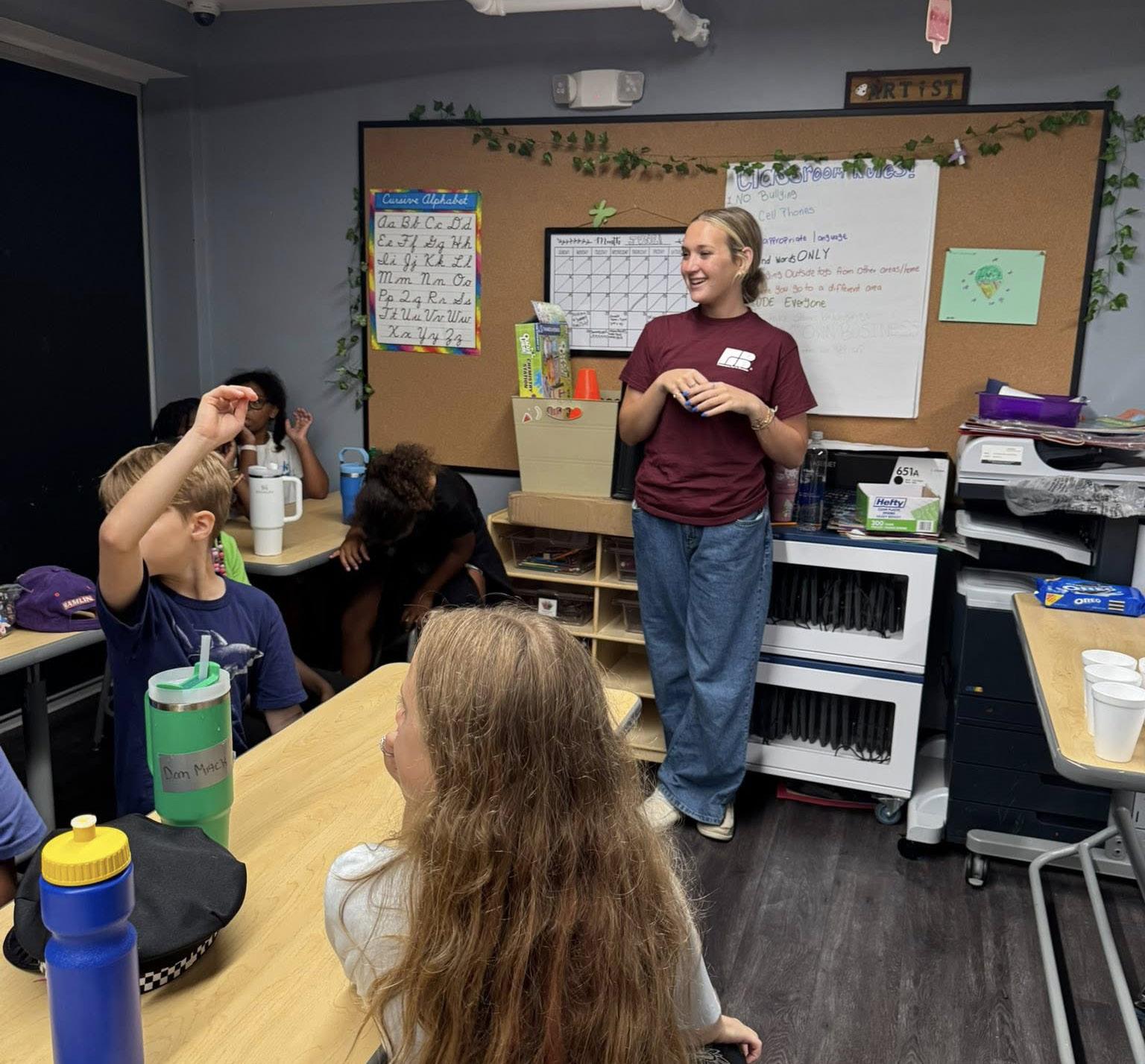

University of Delaware’s Cooperative Extension’s new online Fact Sheet assists agriculture, aquaculture communities
By: Michael Lewis
Delaware Department of Agriculture
Anyone from beginning farmers and aquaculture growers to longtime agriculture or aquaculture leaders can find topics of interest, key tips for project management and a wealth of general agricultural/aquacultural and business information at the University of Delaware’s Cooperative Extension’s new online Fact Sheet. Found at https://www.udel.edu/ academics/colleges/canr/cooperative-extension/fact-sheets/ on-farm-business-planning-existing-resources/, the webpage offers guidance, helpful links and more for everyone in the agriculture and
aquaculture communities.
Launched with input from the Delaware Department of Agriculture, the Delaware Department of Natural Resources and Environmental Control, the Delaware Farm Bureau and the USDA Farm Service Agency the page includes information and links to the following topics:
Programs for Prospective and Beginning Farmers (including links to:)
• Delaware State University Extension
• Chesapeake Agriculture Innovation Center
• University of Delaware Beginning Farm Program
• Horizon Farm Credit
• U.S. Department of Agriculture
• University of Maryland Extension
Business Accelerator and Diversification Programs for Existing Farmers (including links to:)
• Horizon Farm Credit
• Chesapeake Agriculture Innovation Center
• University of Maryland Extension
Other Helpful Resources (including links to:)
• University of Delaware Extension
• Chesapeake Agriculture Innovation Center
• Delaware Farm Bureau
• Delaware Department of Agriculture
• U.S. Department of Agriculture
• Delaware Department of Natural Resources and Environmental Control
• Farm Aid/Cultivemos Resources and Webinars
The Fact Sheet targets new farmers and shellfish aquaculture growers with information on building their businesses and careers and links for resources to assist them in their field, including on DNREC’s Shellfish Aquaculture webpage.
Delaware Agricultural Lands Preservation Foundation announces 36 properties, more than 2,800 acres preserved in 2025
By: Michael Lewis Delaware Department of Agriculture
The Delaware Department of Agriculture announced the 29th round of easement selections by the Delaware Agricultural Lands Preservation Foundation today, preserving 36 properties comprising more than 2,800 acres at a cost of $14.9 million.
Since the program’s inception three decades ago, more than 1,250 First State farms and more than 160,000 acres have been preserved.
Today’s announcement, attended by Governor Matt Meyer, Agriculture Secretary Don Clifton, State Sen. David L. Wilson, Sussex County Administrator Todd F. Lawson, Sussex County Councilman Matt Lloyd and other state and local officials, was hosted at the Oliphant Farm outside Laurel.
The farm, which includes more than 100 acres, has produced corn
and soybeans for the current owners for more than five generations, with the oldest building on the property dating to the 1880s.
Today’s event also coincides with National Farmers Day, which is being celebrated on Sunday, Oct. 12.
“Preserving Delaware’s rich agricultural heritage and providing incentives for farming families to continue to pass their lands to future generations is a legacy everyone can celebrate as we mark National Farmers Day,” Governor Meyer said. “The Delaware Aglands Preservation Foundation is a wonderful partner in that process and today’s easement announcement continues to build on the work done across several Administrations.”
In 1991, the General Assembly passed legislation, signed into law by Gov. Michael N. Castle, to create the framework for the Agricultural Lands Preservation Foundation, which oversees the
preservation program with staffing support from Department of Agriculture employees. The first funding was allocated in 1995 during Gov. Thomas R. Carper’s admin-
istration and the first easement selections were made in 1996.
“The Delaware Aglands Pres-
AG LAND PRESERVATION CONTINUED TO PAGE 16
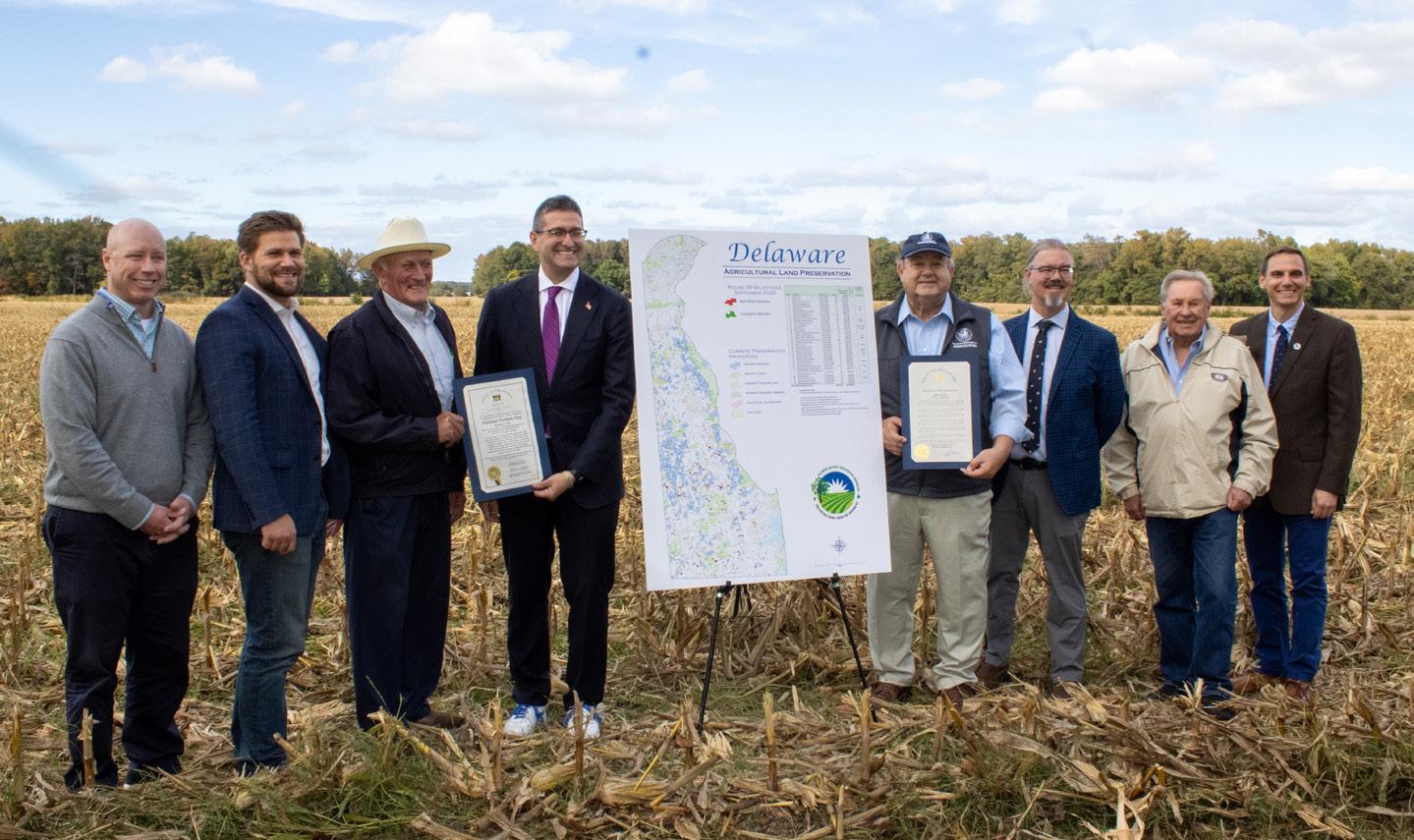
Youth in Ag Spotlight
Delaware State University is Home to Delaware's First Collegiate Farm Bureau
A significant milestone has been achieved for Delaware Farm Bureau, marking an exciting development for both students and the agricultural community in the state. At Delaware State University, a dedicated group of Farm Bureau members has officially established the state’s first Collegiate Farm Bureau chapter. This initiative is led by members Makayla Bradley and Andy Orth, who are dedicated to promoting a deeper understanding and appreciation of agriculture among their peers on campus. Their vision is to engage students through leadership, advocacy, and hands-on
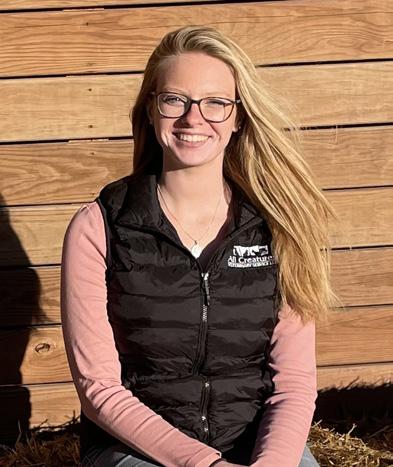
experiences related to farming and agricultural practices.
The establishment of this chapter marks an important step in connecting college students with the broader agricultural community and the mission of the Delaware Farm Bureau. Through meetings, professional workshops, and outreach events, the DSU Collegiate Farm Bureau will provide students with opportunities to learn about agricultural policy, participate in leadership training, and network with industry professionals.
As the first chapter of its kind in Delaware, the DSU Collegiate Farm Bureau hopes to inspire other universities to establish their own chapters. The organization plans to collaborate with both the Delaware Farm Bureau Young Farmers and Ranchers and the Delaware FFA Association to bridge the gap between agricultural education and professional engagement in the field.
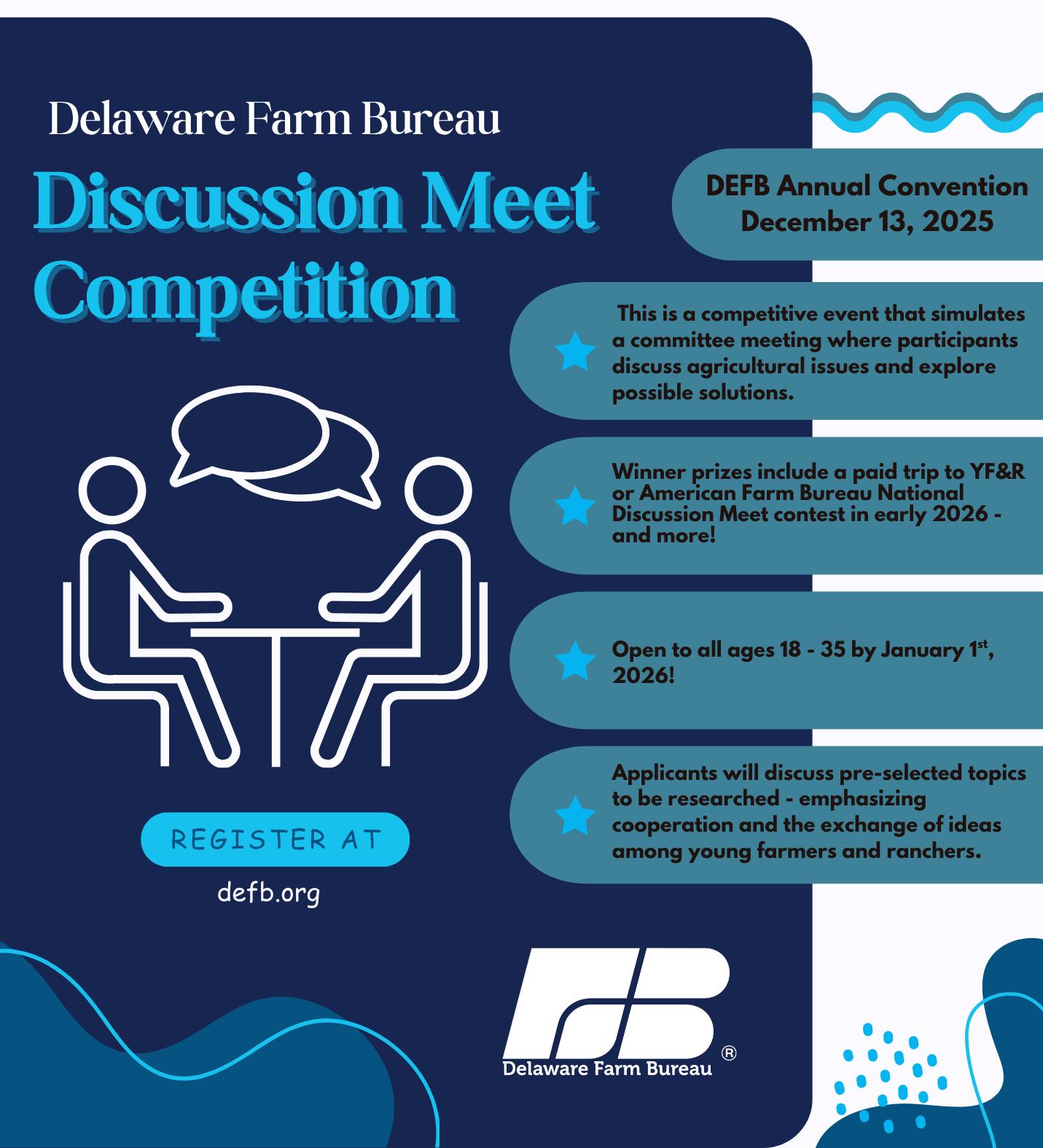
The formation of this chapter signifies an exciting new era for agricultural advocacy at Delaware State University. By empowering students to engage in agriculture, understand key issues, and develop leadership skills, the DSU Collegiate Farm Bureau will play a vital role in cultivating the next generation of agricultural leaders in Delaware and beyond.






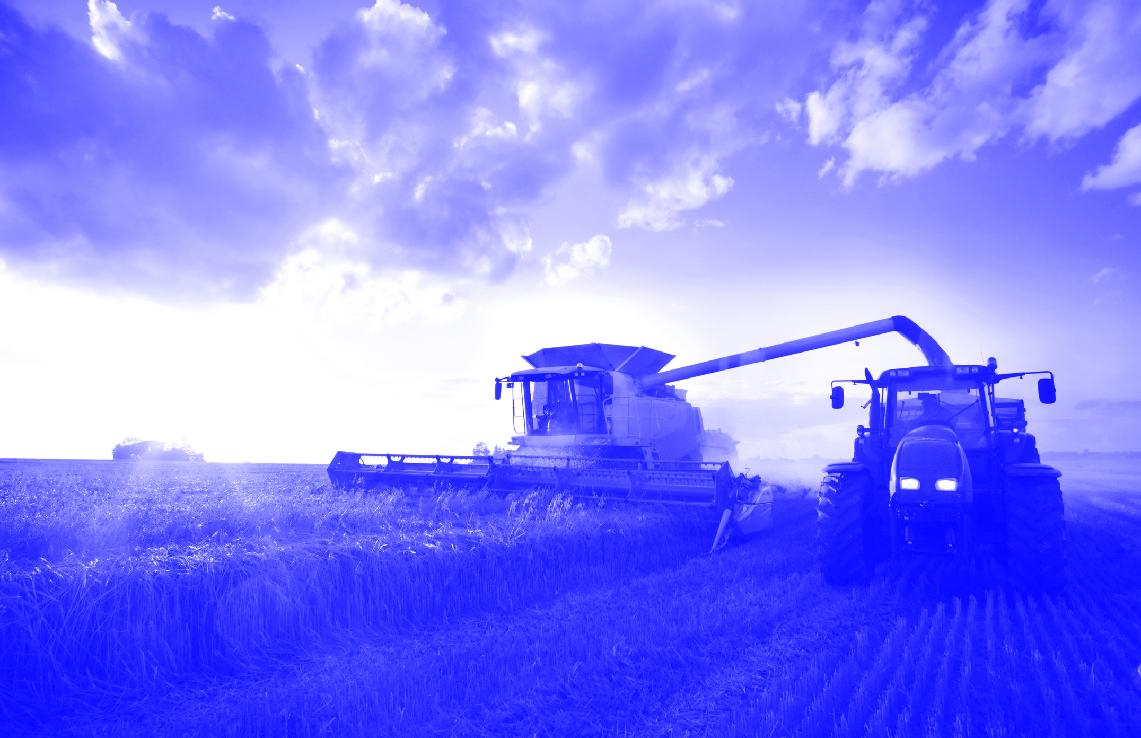

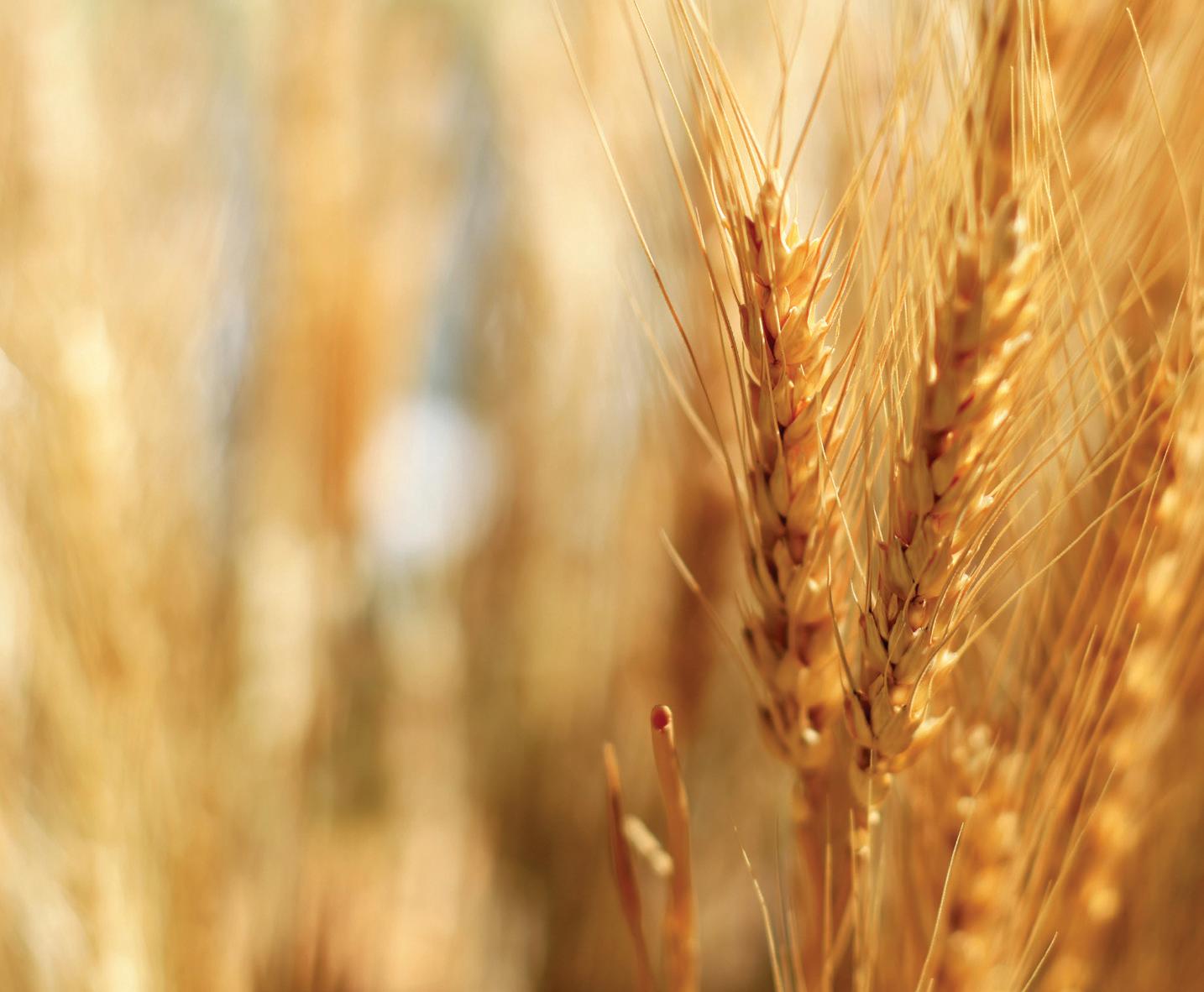

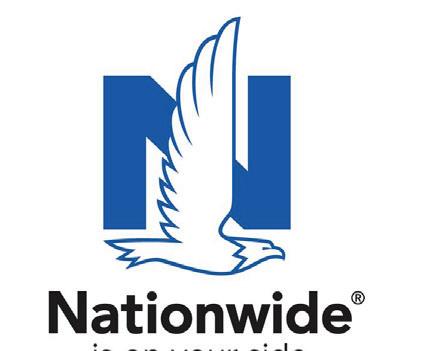

Lace Up for Ag Literacy 5K Raises Over $8,000
Support Agricultural Education Foundation Focus
to
By: Mikayla Paul Delaware Farm Bureau
The Delaware Farm Bureau (DEFB) Foundation, in partnership with Seashore Striders, held their fifth annual Lace Up for Ag Literacy 5K Run/Walk on Saturday, October 18, 2025 at Hopkins Farm Creamery in Lewes, raising over $8,000.
With over 100 participants registered, the event was a great success as runners ran the course knowing their efforts were helping to support agricultural literacy throughout Delaware. The DEFB Foundation is dedicated to engaging youth through interactive lessons that highlight the importance of agriculture and the benefits of fresh, healthy food.
“I would like to thank each and every one of you for your participation in this year’s race,” said Laura Hill, DEFB Foundation board member. “The money we raise from this race will help us transform our Mobile Ag Lab into an Immersion Lab, so we can better engage and educate young students in our com-
munities. If you're a teacher and would like to bring this program into your classroom, we’d be more than happy to make that happen.”
After the race, participants and their families enjoyed the Hopkins Farm Fall Festival, where they visited the Cape Henlopen FFA Chapter’s petting zoo, took hayride tours of the farm, and, of course, indulged in some delicious ice cream. The DEFB Foundation had the mobile ag lab in attendance, where kids could learn about the dairy industry by milking a model cow, explore Delaware’s soil types, and decorate their own barns.
“It is more important today than ever for folks to understand where their food comes from, and the importance that agriculture plays in our industry, especially here in Delaware,” said Amy Hopkins, of Hopkins Farm. “Agriculture is our state’s number one industry.”
For race results, visit https://defb. org/foundation/lace-up-for-ag-literacy/. For more information on the DEFB Foundation, visit https:// defb.org/foundation/.
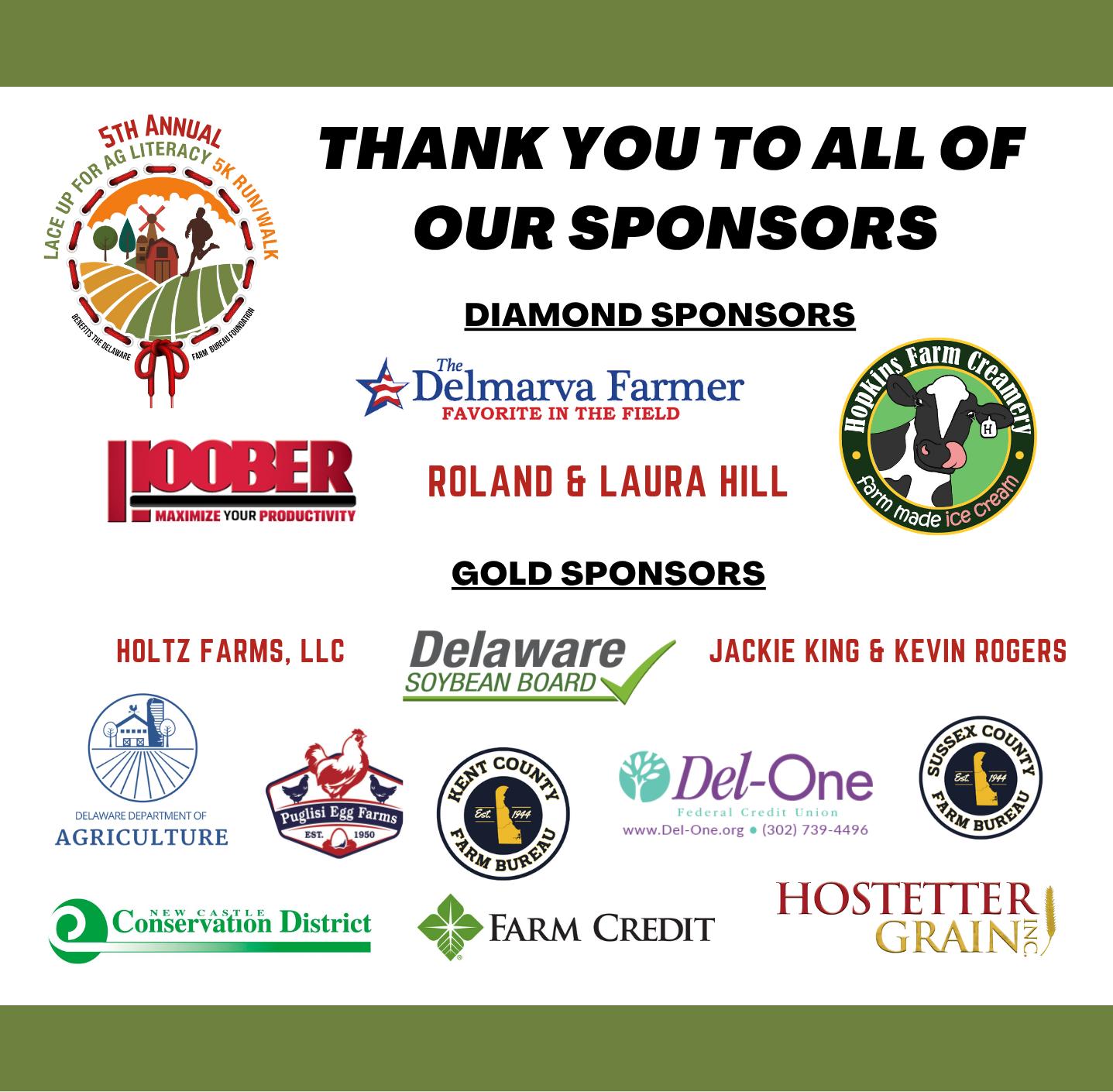

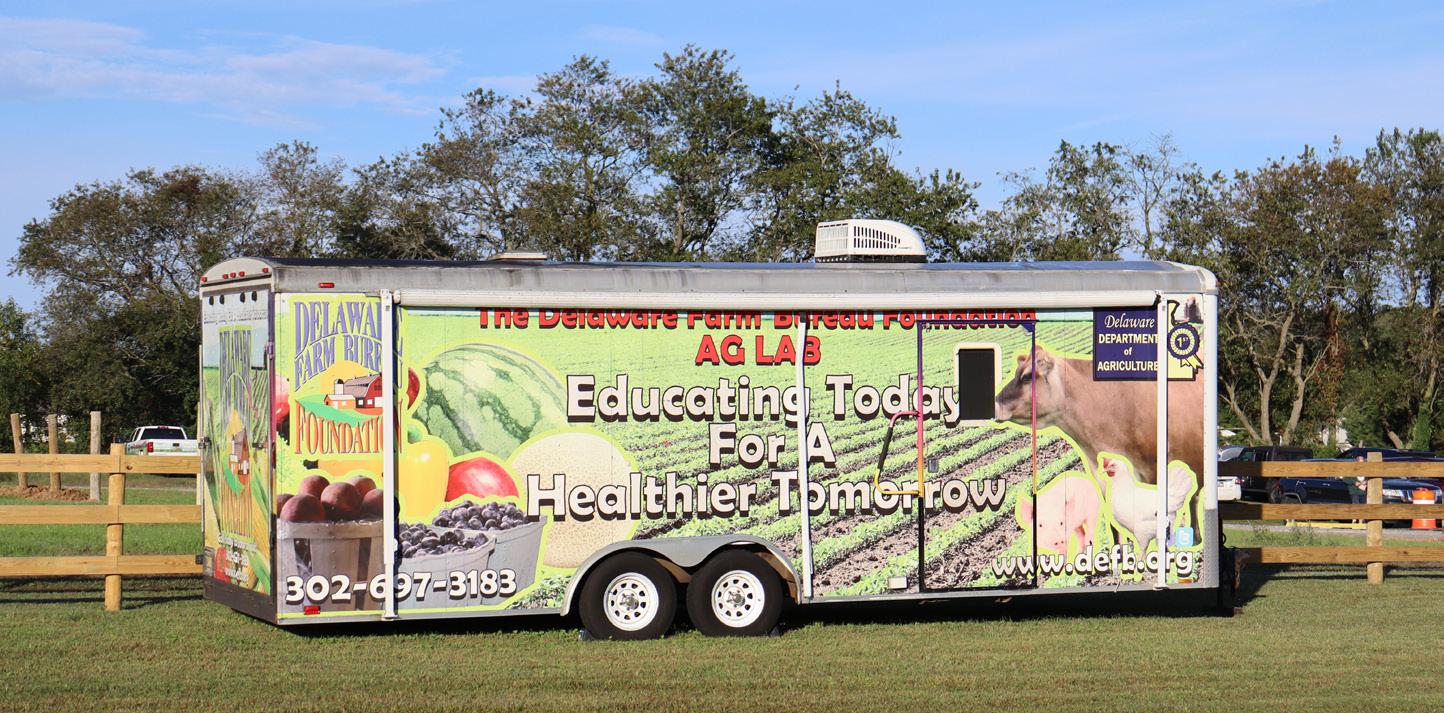

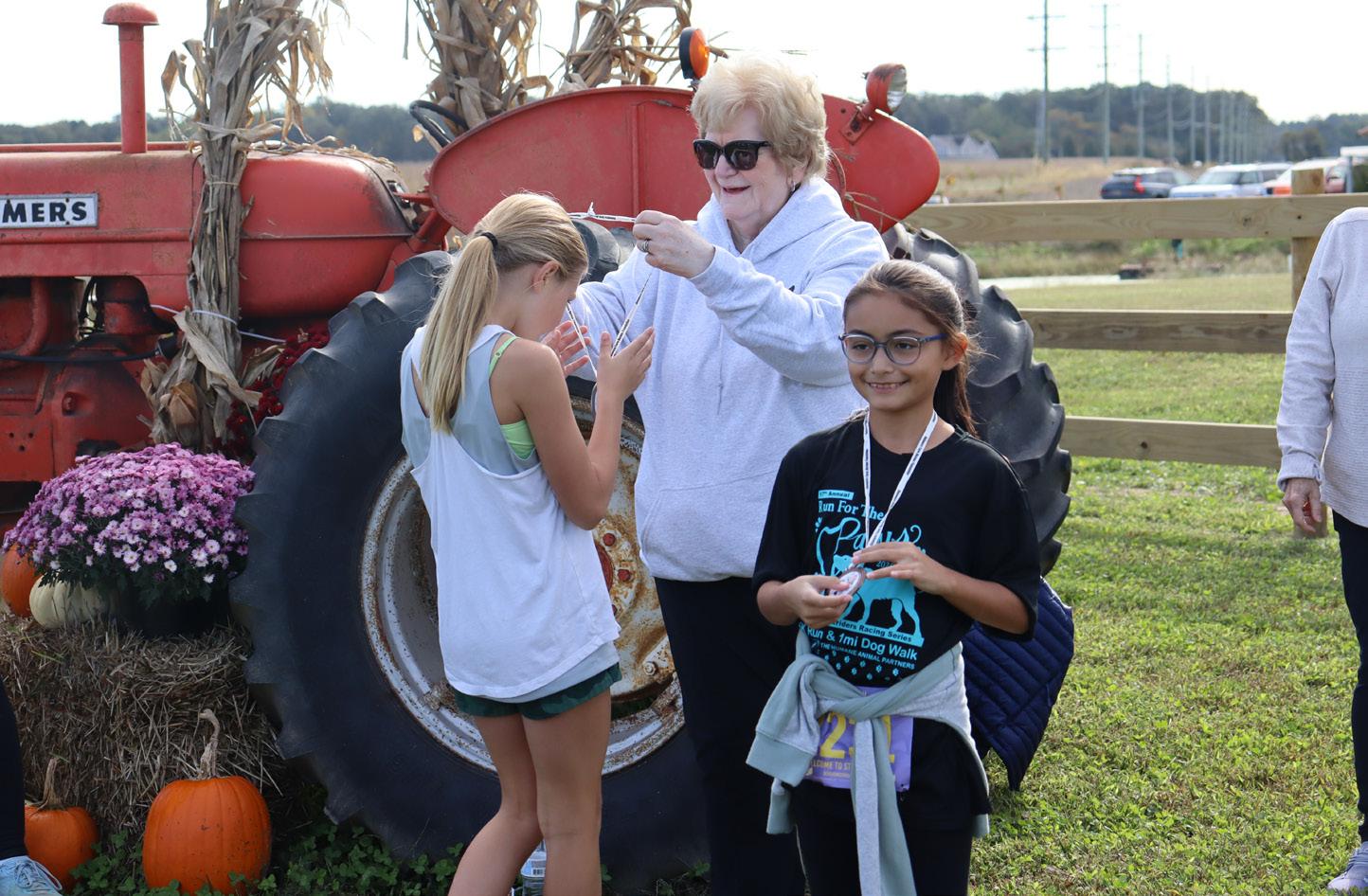
How to Keep Your Fleet Compliant with DEF and Other Essentials
By: Grainger Editorial Staff Grainger
Fleet managers are expected to keep vehicles on the road while also meeting fluctuating emissions standards. Diesel exhaust fluid (DEF) plays a key role, especially for vehicles with selective catalytic reduction (SCR) systems. But DEF is just one of several fluids that help support performance and compliance.
Monitoring and properly storing DEF, coolant and other essential fluids can help prevent delays, avoid fines, and keep your fleet ready for what comes next.
Why Diesel Exhaust Fluid Matters
Because of its role in SCR systems, DEF is essential to how many diesel engines meet federal emission standards. These systems convert harmful gases into nitrogen and water vapor to help meet U.S. Environmental Protection Agency (EPA) standards.
Tampering with or misusing DEF or SCR systems can result in serious compliance risks. The EPA may issue fines of up to $5,000 per vehicle for violating emissions control laws,
including bypassing or mishandling these systems.
Some regulatory rollbacks in 2025 have eased requirements for light-duty vehicles. However, the regulatory environment continues to evolve, especially for heavy-duty fleets preparing for upcoming emissions standards, including those set to take effect in 2027.
Contamination or improper storage can also reduce system performance. Following best practices for handling helps maintain fluid quality and reduce the risk of downtime.
Storing & Handling DEF Safely
Diesel exhaust fluid is sensitive to temperature, light and contamination. While not classified as hazardous, DEF must meet ISO 22241 quality standards and should be stored and handled following OSHA best practices and general chemical safety protocols. Improper storage or handling can reduce its effectiveness and may damage emissions systems.
According to the American Petroleum Institute (API), actions to help maintain DEF quality include: Store DEF in sealed containers in a cool, shaded area between 15
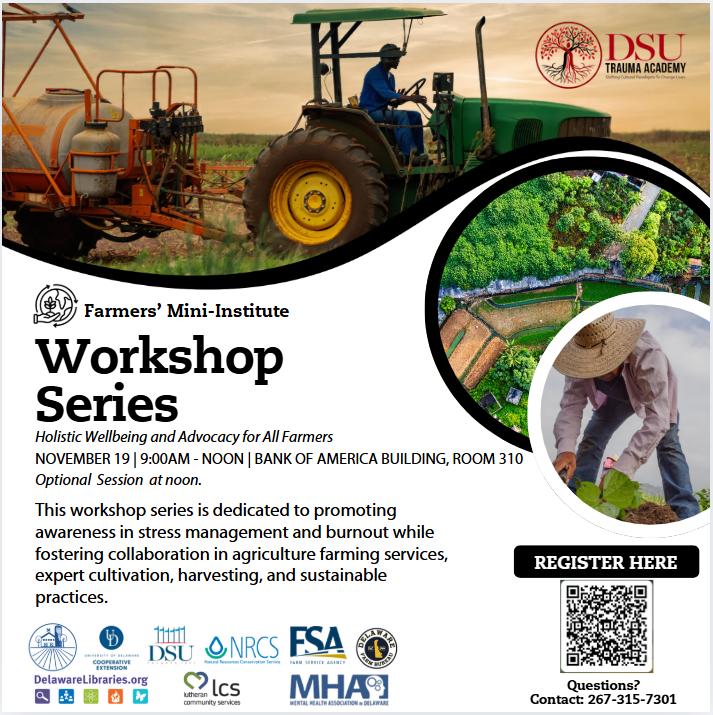
degrees F and 77 degrees F
Use only dedicated pumps, hoses and funnels to prevent contamination.
Only clean dispensing equipment with distilled or de-ionized water.
DEF may freeze at or below 12 degrees F. Freezing won’t damage the fluid, but expansion can cause stress on the container. Let it thaw naturally and avoid repeated freeze-thaw cycles when possible.
Checking lot numbers, manufacturing dates and rotating stock as needed can help ensure DEF quality. If storage conditions may have changed, tools like refractometers are sometimes used to help verify urea concentration.
Plan for Seasonal Demand
Once DEF is stored correctly, the next step is making sure it's available when needed. Strategic inventory planning can help reduce delays and support uptime. DEF consumption can increase during busy operating seasons or with extended vehicle use, and regional usage patterns may vary. Planning ahead based on past trends can help prevent downtime and sup-
NEW CASTLE COUNTYCONTINUED FROM PAGE 4
reflect fair market values as of July 1, 2024. While the county says it won’t collect more in total taxes, many property owners, especially our farmers, are seeing big changes in their bills.
According to the Tyler Technologies Final Report, they valued over 960 agricultural properties. They used something called the “cost approach,” which basically adds up the land value and the cost to replace buildings, minus depreciation. That method doesn’t always reflect the reality of working farmland and buildings.
The General Assembly’s Special Committee is working through ways to help make future reassessments more equitable for all. In the meantime, here is what we know:
Legislation passed during the General Assembly’s Special Ses-
port overall reliability.
Monitor Other Critical Fluids
In addition to DEF, other fluids play an important role in day-today vehicle performance. Antifreeze and coolants help regulate temperature in both traditional engines and electric vehicles, protecting key components from freezing or overheating. Brake cleaners and windshield washer fluids are critical for ensuring visibility and reliable performance in harsh weather. Keeping these fluids stocked and stored correctly can help prevent delays and reduce wear on critical systems.
Keep Your Fleet Ready YearRound Regulations and equipment needs will continue to change, but focusing on proper storage, handling and inventory planning can help keep your fleet compliant and prepared.
DEF is just one part of a broader strategy. Keeping essential fluids, safety gear and emergency tools stocked and properly maintained can help reduce downtime and keep operations on track.
sion on August 12 requires NCC to extend the tax payment deadline to November 30, 2025, and is offering payment plans and penalty relief to qualifying property taxpayers.
A lawsuit is also pending, challenging a new law that introduces different tax rates for residential and nonresidential properties, scheduled to commence towards the end of October 2025.
I know this process has been frustrating. But I want you to know that the New Castle County and Delaware Farm Bureau are keeping a close eye on this. We’re working to make sure farmers are treated fairly and that our land is valued for what it really is, working farmland and agriculture buildings, not just real estate.
If you haven’t already, take a close look at your assessment, file an appeal if needed, and don’t hesitate to reach out for help. We’re all in this together.
-ervation Foundation is one of the jewels of the entire First State agricultural community,” Agriculture Secretary Clifton said. “The program has been cited as the best in the nation at preserving and protecting farmland for future generations to use and enjoy. The Delaware Department of Agriculture is proud to assist First State residents through this process and our team can answer any questions families may have as they explore their future land-use options.”
The Delaware Agricultural Lands Preservation Foundation easements are available for viewing through an online dashboard at https:// de.gov/agdashboard. The Foundation selects farms approved for easement purchase using an impartial discounted ranking system that maximizes taxpayer benefits.
The Foundation does not own the land but purchases landowners’ development rights and places a permanent agricultural conservation easement on the property. Landowners must first voluntarily enroll their farm into a 10-year preservation district and are eligible for permanent preservation the year after they apply.
This year’s easements include properties in all three First State counties. Each county government contributed toward the preservation costs of selected easements, with
the breakdown below. The Oliphant Farm’s easement, as an example, was half paid with Sussex County funds.
• Sussex County: $1,917,156 for eight easements
• New Castle County: $225,769 for one easement
• Kent County: $100,000 for seven easements
“Sussex County is proud to continue its partnership with the State of Delaware in this very worthwhile program, and we’re especially excited to be making the largest contribution ever by the County government to ensure agriculture remains visible and viable in the First State,” Sussex County Council President Douglas B. Hudson said. “Agriculture is more than our No. 1 industry. It’s a way of life, a part of our heritage and our legacy, one that we must do everything in our power to protect for the generations to come.”
“New Castle County is pleased to continue our partnership with the state’s Aglands Preservation program,” said New Castle County Executive Marcus A. Henry. “The inclusion of the Dunning Farm in this round of funding will continue New Castle County goal of preserving agricultural lands, allowing our farming community to remain vibrant and keeping open vistas in our rural areas.”
“Kent County is proud to play a vital role in safeguarding Delaware’s agricultural heritage,” said
Kent County Levy Court President Joanne Masten. “By preserving farmland, we’re not just protecting open space — we’re investing in the future of farming, food security, and the rural character that defines our community.”
The Delaware Agricultural Lands Preservation Foundation’s Board has extended the 2026 deadline for new agriculture district applications to Friday, Oct. 31. Any current district, or new district that applies by the deadline, will be eligible submit an offer for permanent preservation in 2026.
“This is a great time to think about preserving your farm because farmland values are going up, which increases our easement appraisals,” said Jimmy Kroon, chief of planning for the Delaware Department of Agriculture. “This means we are paying more than ever for agriculture easements, at least double what we may have paid five to 10 years ago. I’d encourage any landowner interested in farm preservation to call us to have a conversation about what the process is like.”
Delaware farmers interested in preserving their farms should be sure they meet the following eligibility requirements:
• Property must be zoned for agriculture and not subject to any major subdivision plan.
• The property meets the minimum Land Evaluation and Site Assessment (LESA) score of 170. LESA is a pro-
cess that attempts to estimate the farm’s long-term viability based on the farm’s soil productivity, land use, and agriculture infrastructure on and around the farm. Scores range from 0-300. Aglands program staff calculate the LESA score when applications are received.
• The property must be working farmland with at least $1,000 in agricultural sales annually and generally have at least 10 acres of cropland.
• Farms of 200 acres or more constitute an agricultural district.
• Farms under 200 acres can enter the program if it is within 3 miles of an existing agricultural district.
For more information or to obtain applications related to the Delaware Aglands Preservation Program, interested landowners can visit https://de.gov/aglands or call (302) 698-4531.
The Delaware Agricultural Lands Preservation Foundation’s Board of Trustees includes representatives from agriculture and state agencies. Trustees include Chairman Mark Collins (chairman), James G. Vanderwende (vice-chairman), Janice Truitt (treasurer), William H. “Chip” Narvel Jr. (secretary), Dorothy Abbott, Theodore P. Bobola Jr., Robert Emerson, H. Grier Stayton, Agriculture Secretary Clifton and State Treasurer Colleen C. Davis.
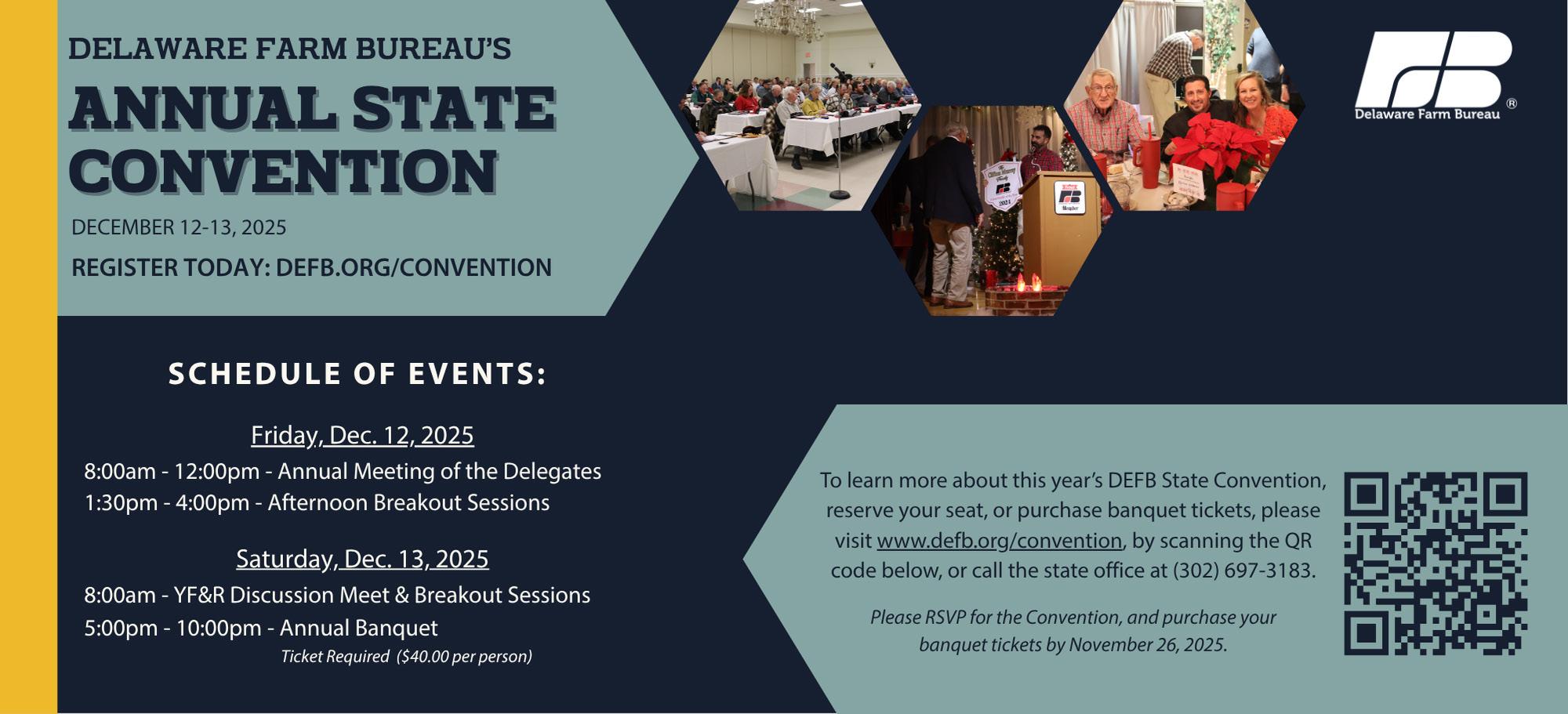
Updates from AFBF National Women in Ag Study Launches
By: AFBF Staff
American Farm Bureau Federation
Women play a vital role in American agriculture, contributing through production, advocacy, education, and entrepreneurship. To better understand their experiences, leadership pathways, and future needs, the National Women in Agriculture Study is launching this fall as a comprehensive effort to capture women’s voices from across all 50 states and Puerto Rico.
The survey, open from Oct. 15, 2025, through March 31, 2026, will gather insights from women working in production agriculture, agribusiness, education, and advocacy, as well as from men and others in related fields who can offer perspectives on women’s roles in agriculture. Optional follow-up interviews and focus groups will provide deeper exploration of leadership, mentorship, barriers, and opportunities. The study will be available in both English and Spanish.
“Women are essential to the strength, sustainability, and future of U.S. agriculture,” said Isabella Chism, chair of the American Farm Bureau Women’s Leadership Committee. “This study will help us identify what’s working, where the-
re are gaps, and how to strengthen engagement and support systems across the agriculture sector.”
Key objectives of the study:
• Capturing diverse perspectives from all 50 states and Puerto Rico
• Understanding leadership pathways, mentorship experiences and advocacy efforts
• Identifying training needs and preferences for women in agriculture
• Highlighting opportunities for community-building and representation
Findings will be shared at the International Year of the Woman Farmer ACE Summit in Washington, D.C., in June 2026. Results will inform leadership development, outreach strategies, and systems that strengthen support for women in agriculture nationwide.
The survey is open to individuals age 18 and older who are involved in or connected to agriculture, forestry, or life sciences, including related industries such as aquaculture, horticulture, beekeeping, and more.
Take the survey at www.fb.org/ program/womens-leadership/ national-women-in-agriculture-study.
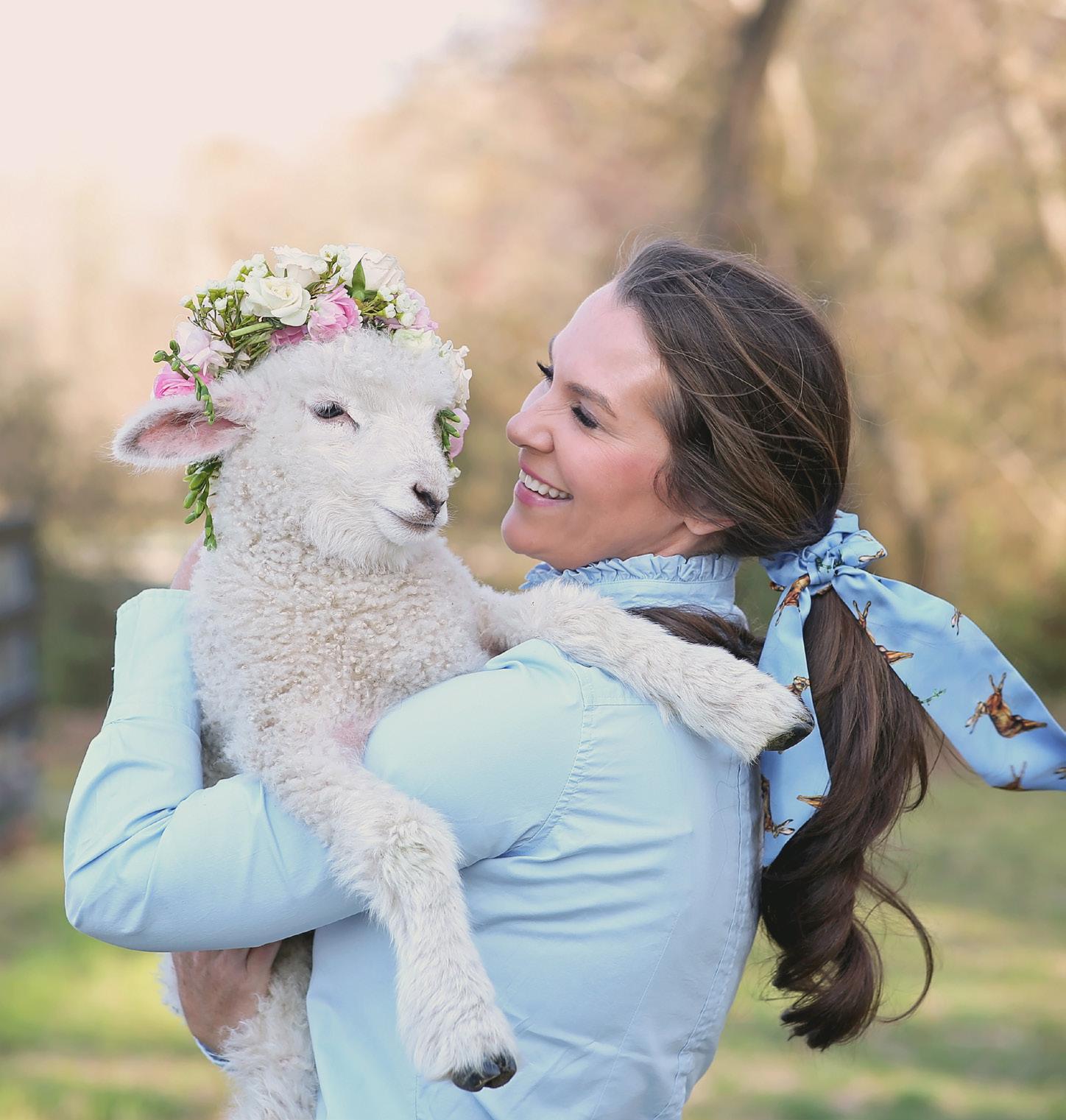
Grain Storage Remains Tight
Farmers are again heading into harvest with big grain crops and limited space to put them.

Strong production and large carryover stocks have already weighed on prices, and another record crop is set to add to the pile. Slowing export demand and high transportation and storage costs compound the challenge, leaving little room for relief in the months ahead. The latest USDA September
Grain Stocks and September World
Agricultural Supply and Demand Estimates (WASDE) reports highlight how abundant production and trade uncertainty are likely to disrupt markets and prolong pressure on farm profitability into 2026.
WASDE Outlook Confirms Tight Margins
The September WASDE report reinforces that farmers are entering another year of strong supply and limited price strength. USDA projects corn production for 2025/26 at a record 16.8 billion bushels, supported by slightly higher harvested acreage that offsets a modest drop in yield. This would far exceed last year’s 14.87 billion bushels, underscoring how large
this harvest is expected to be. Even with exports projected to rise by 175 million bushels, going from 2.8 billion last year to 2.975 billion this year, ending stocks are still expected to remain near 2.1 billion bushels, a level that continues to weigh on market prices.
Soybean production is also projected higher at 4.3 billion bushels (up from the August projection of 4.29 billion bushels), reflecting expanded acreage that more than offsets lower yields in some regions. However, USDA lowered projected export demand by 20 million bushels to 1.68 billion bushels, signaling continued challenges for international competitiveness. The result is a modest increase in expected ending stocks, adding to overall
supply pressure.
Normally, the October WASDE would have provided the next update on crop projections and demand adjustments, but with federal government funding uncertain, that report was not released as scheduled. This pause in data will leave farmers and markets without USDA’s monthly benchmark during a critical point in harvest.
Heavy Carryover Persists Across Grains
While corn and soybean inventories have eased compared to last year, they remain historically large. As of Sept. 1, corn stocks
totaled 1.52 billion bushels, down 13% from 2024. Corn stored on farms was 640 million bushels, down 18% from a year ago, while off-farm stocks totaled 880 million bushels, down 10%.
Soybean stocks were estimated at 315 million bushels, down 8% from last year. On-farm soybean stocks totaled 92 million bushels, down 18%, and off-farm stocks were 223 million bushels, down 3%.
Wheat moved in the opposite direction. Total wheat stocks were estimated at 2.12 billion bushels, up 6% from 2024. On-farm wheat stocks were 690 million bushels, up 4%, while off-farm stocks reached 1.43 billion bushels, up 7%. USDA also revised 2024 production upward by 25 million bushels for corn and 7.7 million bushels for soybeans, slightly increasing residual supply.
Storage Capacity: Adequate on Paper, Tight in Practice
Behind those numbers lies a growing logistical strain. Total U.S. grain storage capacity increased only slightly in 2024, up 35 million bushels (0.1%) from 2023. Combined on-farm and offfarm capacity as of Dec. 1, 2024, totaled 25.5 billion bushels, virtually unchanged from the year before.
On-farm storage refers to bins and facilities owned or leased by farmers, while off-farm storage includes commercial elevators, warehouses, terminals and mills operated by cooperatives or private firms. Storage capacity may appear adequate nationwide but it is unevenly distributed.
Major Corn Belt states such as Iowa, Illinois, Minnesota and Nebraska hold nearly half of all U.S. on-farm capacity. However, most of those states have added very little new space in recent years even as production has grown. Some elevators are already near capacity before harvest begins, particularly in areas where low river levels continue to restrict
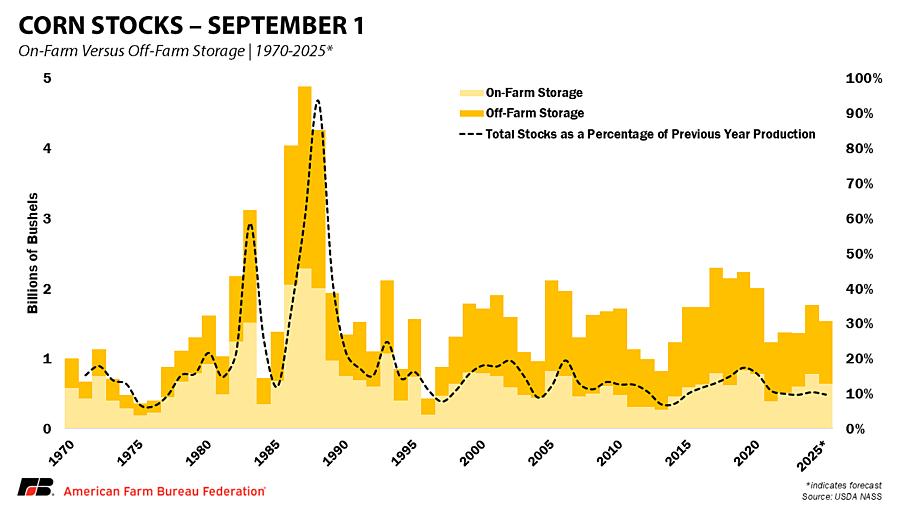
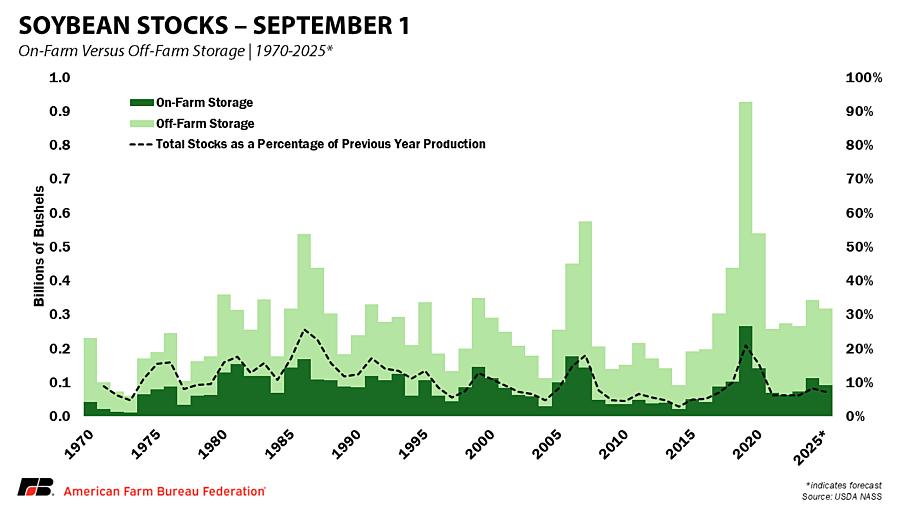
barge traffic.
Grain Storage as the System’s Pressure Valve
When transportation slows, storage becomes the pressure valve that keeps the system from seizing up. U.S. storage capacity is estimated at 25.48 billion bushels, which leaves roughly 2.4 billion bushels less space than needed to hold total production and existing stocks. This shortfall is based on combined corn, soybean, wheat, sorghum, barley and oat production along with beginning stocks reported in USDA’s September WASDE.
That means the system is effectively operating without a buffer, and any delay in grain movement or regional bottleneck can quickly lead to storage overflow. Regions dependent on river or rail transport may face sharper congestion as grain piles up awaiting shipment.
Even where bins are available, the cost of holding grain has increased sharply. Higher interest rates and energy and labor costs
all contribute to higher carrying costs. In some cases, interest alone can account for one-quarter to one-third of total storage costs. Holding grain also ties up capital that could otherwise be used for operating expenses or debt repayment. If prices weaken during the storage period, producers bear both declining value and continuing debt service.
Conclusion
This marketing year will be defined by full bins, higher production costs and constrained transportation. Corn and soybean stocks remain heavy while wheat adds more volume to the system. Storage is adequate on paper but tight in practice, especially in major grain-producing states where infrastructure growth has lagged production. With the October WASDE on hold and river levels still low, farmers are managing not just another large harvest but another year where space, liquidity and timing will determine profitability.
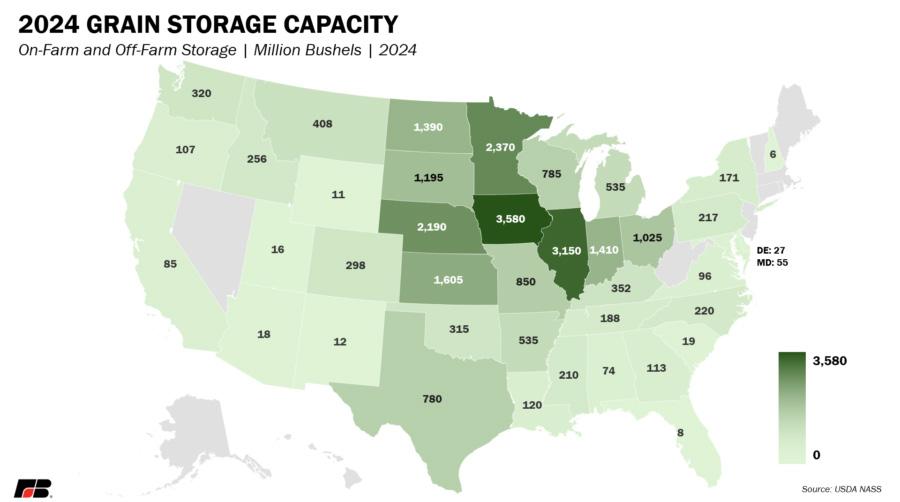
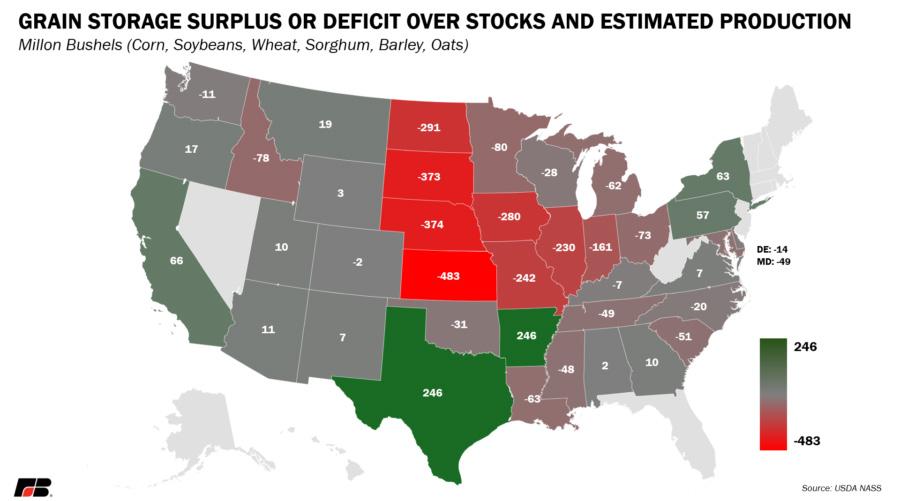
Darkest Before Dawn – Steve Breeding’s Story
By: Bailey Corwine American Farm Bureau Federation
Farmers and ranchers are known for their resilience, determination, and—most of the time—optimism. They plant seeds without knowing if the rain will fall or raise livestock with no guarantee of plentiful grass and do so with no crystal ball to predict market conditions once it’s time to harvest. It takes a lot to shake a farmer or rancher. The definition of their “worst day” is often times the type of day that would bring anyone to their knees and maybe even keep them down.
That “worst day” came for Delaware farmer Steve Breeding on a spring afternoon last year, when more than 200 of his sheep were killed in a tragic barn fire. Already feeling stress from other aspects of his life, the loss of his animals was too much for Steve to bear.
For weeks after the accident, Steve suffered in silence. He closed himself off from his friends and family and refused offers of help from neighbors and fellow Farm Bureau members, afraid to let other people see just how much pain he was in.
His anguish eventually led to a turning point. Alone in his pickup truck, parked out by the rubble of
what used to be his sheep barn, Steve gripped a pistol, contemplating ending his life. Then, out of the corner of his eye, he caught a glimpse of a Farm State of Mind flier promoting mental health resources available to rural communities. Steve made a decision: he put down his pistol, reached for the flier and dialed the 988 crisis lifeline listed on the bottom of the page.
From there, Steve’s story is one of hope, perseverance, and eventually, inspiring others to open up about their own struggles with mental health. With the help of medication and the support of his community, Steve began to heal from the stress he was facing at the time of the fire.
He cleaned up the remnants of his old sheep barn, built a new one this year and he now shares the story of that fateful spring day whenever he’s given the opportunity—from small events in his home state of Delaware all the way to the national stage at the 2025 American Farm Bureau Convention as part of a workshop on farmer and rancher mental health.
Along the way, he’s met countless others who have faced difficult times and felt moved to share their story with him. He’s realized
that mental health challenges aren’t just a problem for one generation of agriculture or because of one downturn in a certain market — depression, anxiety and related conditions are common in this industry, but no one has to suffer alone. Help and resources are available.
The shadow of Steve’s worst day eventually led him to the light of his current path, proof for all of us that better days often lie just around the bend.
Bailey Corwine is a communications manager at the American Farm Bureau Federation.

New Agriculture Wage Rate Rule Important Step in Reform
By: AFBF Staff American Farm Bureau Federation
A new wage rate rule for agricultural guestworkers takes a much-needed step towards reforming regulations that have put labor out of reach for many of America’s farmers. The Department of Labor announced its new Adverse Effect Wage Rate (AEWR) Methodology for the Temporary Employment of H-2A Nonimmigrants in Non-Range Occupations in the United States. The new rule revises agriculture wage rates for all 50 states and Puerto Rico.
“Farm Bureau thanks the Trump administration, Secretary Lori Chavez-DeRemer and Secretary Brooke Rollins for advocating for solutions to a broken system,” said
AFBF President Zippy Duvall.
“For many farmers, prices for the products they raise are low while production expenses are at record highs, so a fair wage rate is essential. In most states, the new rates will help farmers afford to get crops from the fields to the tables of America’s families.
“This new rule holds promise for many farm families who would be out of business if not for the H-2A program. We look forward to working with the administration to ensure more transparency, predictability and clarity as it implements the rule, and we remain committed to working with Congress for more lasting reforms that provide mutual benefit for workers and farmers while ensuring both can continue to stock America’s pantries.”
Farm Bureau has long advocated for changes to the AEWR. Labor costs can be nearly half the cost of production, making it hard for farmers to break even and more expensive to grow food domestically. Higher production costs, including through regulatory hurdles and administrative requirements, can ultimately lead to more dependence on imported foods, especially for labor-intensive crops.
Some members of Congress have demonstrated a willingness to work in a bipartisan manner to find solutions to agricultural labor issues. The House Agriculture Committee’s Agricultural Labor Working Group identified challenges and solutions in a 2023 report.
A newly released study from professors at the University of Cal-
ifornia, Berkeley and University of California, Davis recommends a number of solutions to agricultural labor challenges in the U.S. Those recommendations include:
• Defining and identifying an adverse effect on domestic workers;
• Recognizing the changes in guestworker programs from when the AEWR originated;
• Changing wage calculations to provide more predictability in year-to-year changes;
• Removing H-2A employee wages from AEWR calculations; and
• Considering the additional costs to employers of utilizing H-2A beyond wages, including housing.
Session on August 12, the General Assembly passed Senate Concurrent Resolution (SCR) 122, which established a joint committee to conduct a comprehensive review of the reassessment process and recommend improvements for future cycles. While the resolution did not set a specific timeline or require the committee to report back formally, this review will likely lead to legislative action. Property reassessment and property tax reform continue to be top priorities for DEFB. We remain committed to keeping our members informed about developments and ensuring that the interests of ag and rural communities are represented in these discussions.
Upcoming Election Year
2026 is an election year for 11 senatorial districts, and all 41 seats in the House. With elections
on the horizon, we expect a flurry of high-profile, attention-grabbing bills as candidates seek to highlight their agendas. DEFB will closely monitor these developments, ensuring our priorities are represented and navigated strategically. We also encourage all members to confirm their voter registration and actively participate in the democratic process.
Get Involved
DEFB members are essential to shaping ag policy in Delaware. Stay informed, connect with your elected officials, and make your voice heard. Your involvement strengthens both our advocacy efforts and the democratic process. If you have questions about DEFB’s advocacy initiatives, or if you are experiencing issues or have concerns, please reach out to Sydnie Grossnickle, DEFB Government Affairs Coordinator, at sydnie.grossnickle@defb.org or (302) 697-3183.
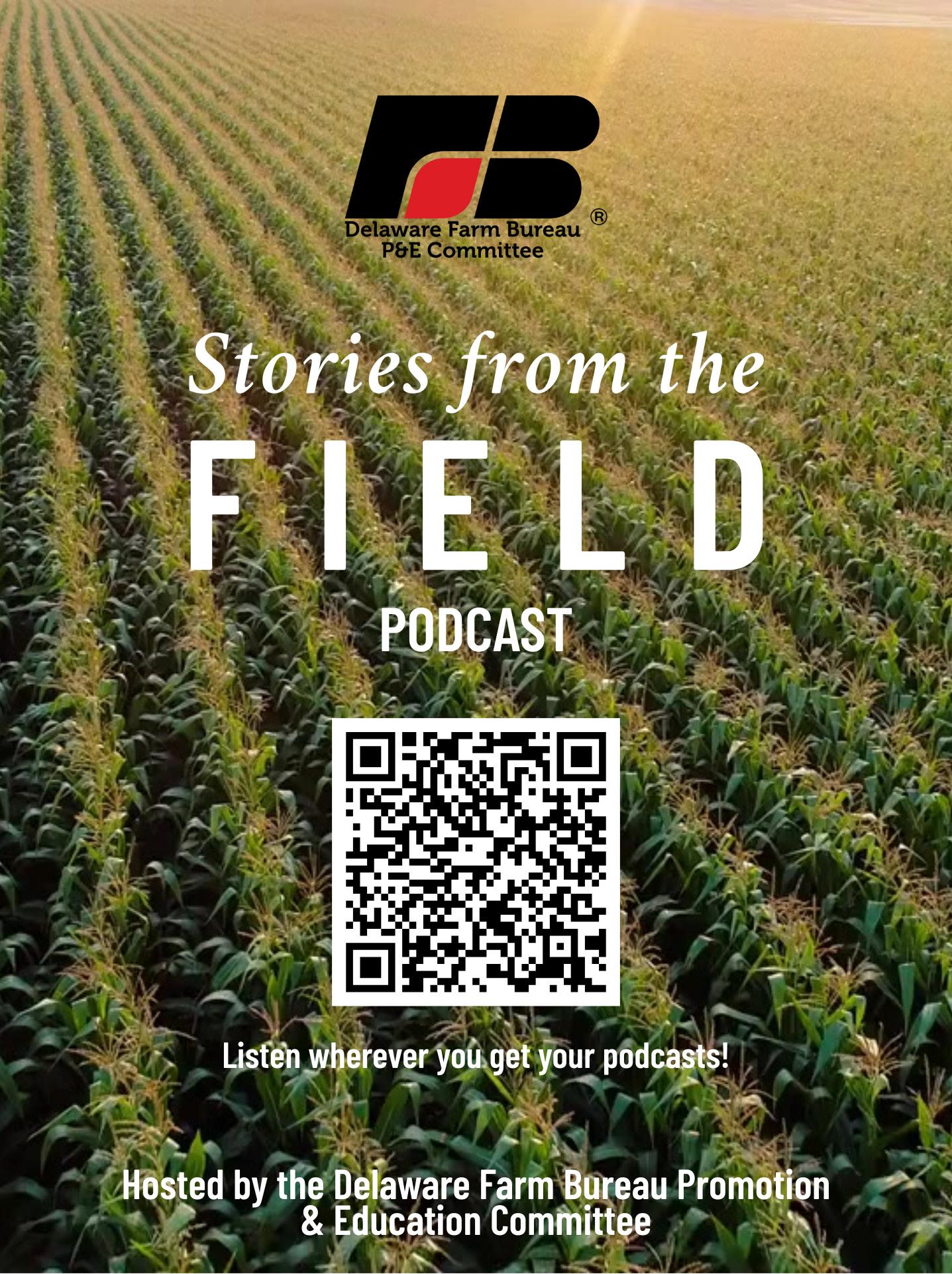

Local Fire Department Awarded Life-saving Rescue Resources To Help Defend Against Grain bin Accidents Nationwide News

On October 4, local first responders with Frankford Volunteer Fire Company were awarded a grain rescue tube and specialized training from Delaware Farm Bureau through Nationwide’s Grain Bin Safety advocacy campaign. The resources will be used to help protect against grain entrapments, which result in dozens of deaths across rural America.
Every year, thousands of farmers and commercial grain handlers risk their lives by entering grain bins to remove clumped or rotted grain. As rural communities have come to know all too well, the risks of entering grain bins continue to be overlooked.
“It only takes seconds, or a simple mistake, for an adult to sink in the quicksand-like flow of grain and become fully entrapped or engulfed,” said Brad Liggett, president of Agribusiness at Nationwide. “Adding to the risk is a lack
of rescue equipment available to local fire departments and emergency responders who are called for help when a worker becomes trapped.”
To help lead the fight against these accidents impacting agricultural communities, Nationwide began its Grain Bin Safety campaign in 2014 to bring awareness to the hazards of entering grain structures and to equip fire departments with the resources needed to respond effectively.
Frankford Volunteer Fire Company is one of more than 390 fire departments to receive these resources and benefit from the program since its inception.
“We’re proud to support our local first responders with tools that can save lives,” said Delaware Farm Bureau President Bill Powers. “Grain bin accidents are real dangers in farming, and this training helps make sure our communities are better prepared.”
The grain rescue tube delivery and training was conducted by the National Education Center for Agricultural Safety (NECAS) and included simulations of entrap-
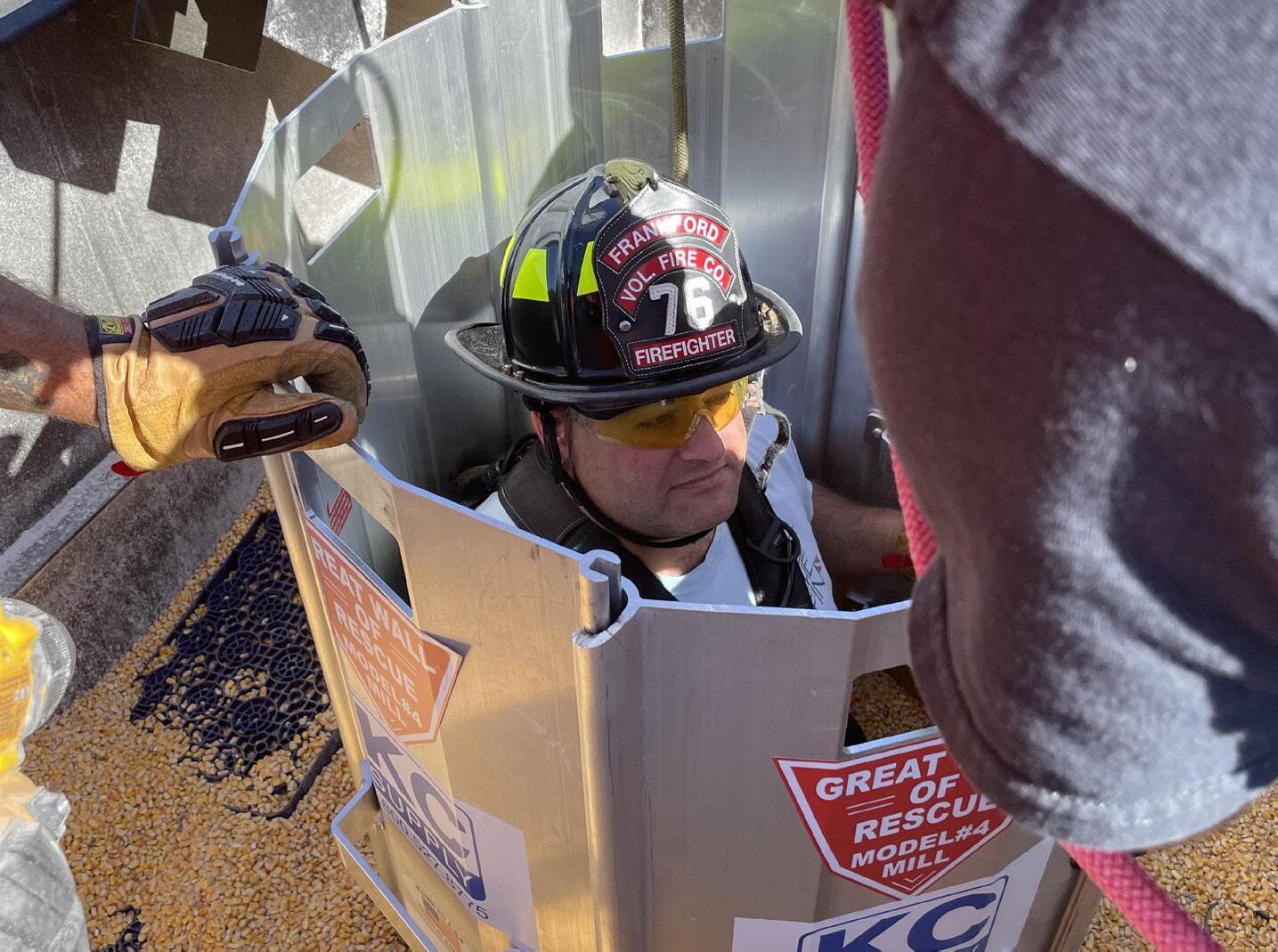
ments and rescues using a stateof-the-art grain entrapment simulator, which is loaded on a trailer and able to hold about 100 bushels of grain.
Since 2014, at least 13 successful rescues have utilized these resources, including six successful rescues last year.
“With long-standing roots in agriculture, we’re thankful for the work America’s farmers do and for the contributions of our valuable partners who help us make a difference with this campaign in rural communities,” said Liggett.
To learn more or view grain bin safety resources, visit www.thinkgrainbinsafety.com.
About Nationwide
Nationwide, a Fortune 100 company based in Columbus, Ohio, is one of the largest and strongest diversified insurance and financial services organizations in the United States. Nationwide is rated A+ by Standard & Poor’s. An industry leader in driving customer-focused innovation, Nationwide provides a full range of insurance and financial services
products including auto, business, homeowners, farm and life insurance; public and private sector retirement plans, annuities and mutual funds; excess & surplus, specialty and surety; and pet, motorcycle and boat insurance.
For more information, visit www.nationwide.com.
Subscribe today to receive the latest news from Nationwide and follow Nationwide PR on X.
All cash contributions help purchase grain bin tubes and/or training. All donations are managed through the National Education Center for Agricultural Safety (NECAS), a 501(c)(3) non-profit. For official rules, visit nationwide.com/GBSWContestRules “FARM BUREAU” and the Farm Bureau mark are registered service marks of the American Farm Bureau Federation and used under license by Nationwide. Nationwide, Nationwide is on your side and the Nationwide N and Eagle are service marks of Nationwide Mutual Insurance Company. © 2025
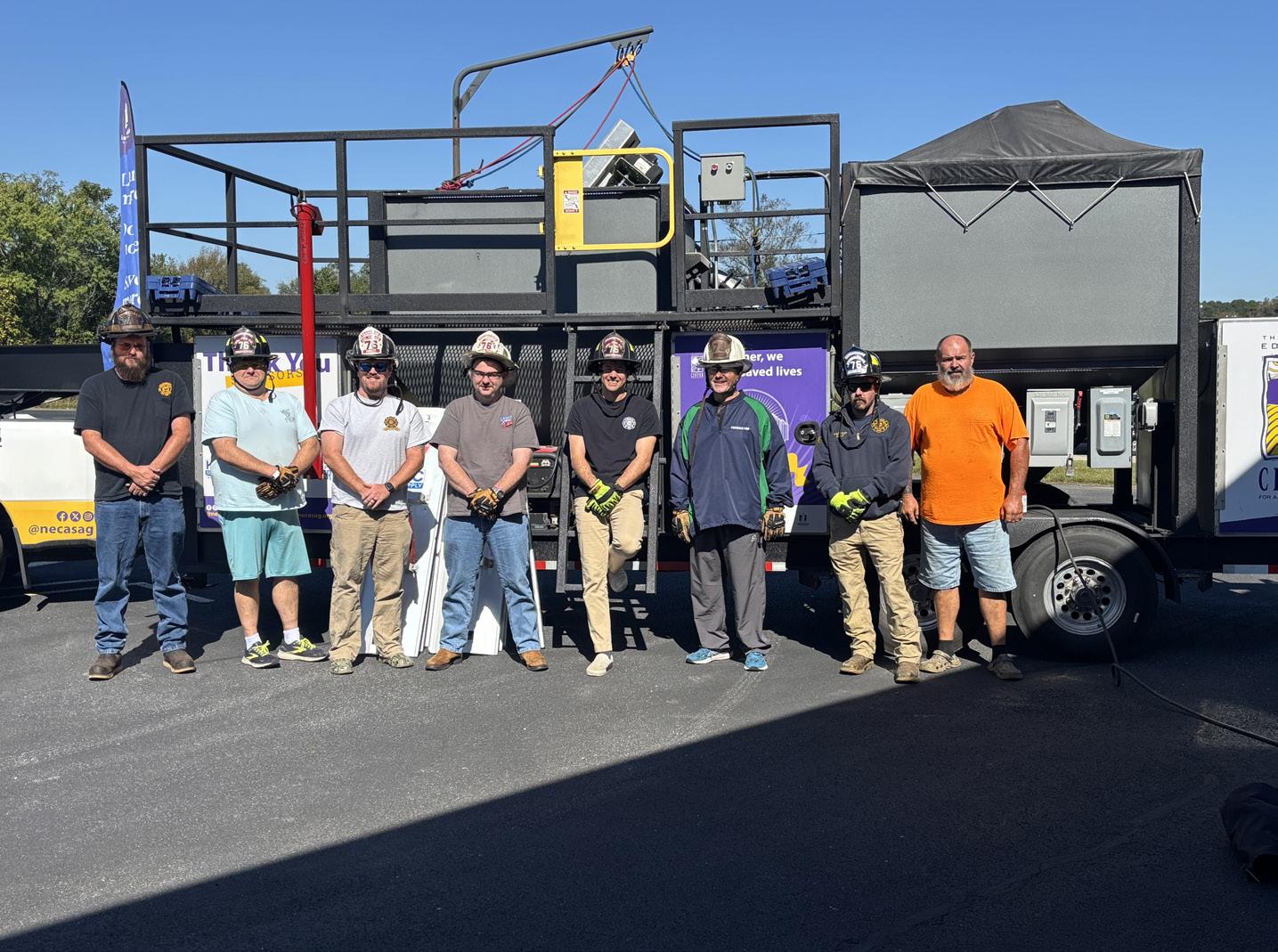
Building a Stronger Agricultural Community Through Nationwide and Delaware Farm Bureau
By: Jaiden Cain
Delaware Farm Bureau
Delaware Farm Bureau is proud to have Nationwide as a Heritage Partner, continuing its longstanding commitment to promoting and protecting agriculture. Liz Harrison, an insurance agent with the Kathy Barry Agency, deeply values Nationwide’s dedication to the agricultural community.
Founded as the Farm Bureau Mutual Automobile Insurance Company, Nationwide has always had agriculture at its core. Established in Ohio to provide affordable car insurance for farmers, the company has maintained strong ties with Farm Bureaus across eight states, emphasizing its mission to support agriculture.
To ensure high quality service for agricultural clients, Nationwide offers specialized training for agents to become Farm Certified. This program equips agents with the knowledge and confidence to protect farmers and ranchers effectively.
Harrison emphasized the importance of believing in the products she offers. “I can sleep better at night knowing that Farm Bureau members are well protected and that I was a part of that, representing Nationwide,” she shared.
Nationwide’s commitment to agriculture extends across the diversity of the industry, such as the recent rise in small and mi-
cro farms. Recently, they have worked to grow their resources for small farms, recognizing the constant changing landscape of modern agriculture.
Dependability is important to Nationwide. Harrison values that her clients can rely on both her and the company for quality coverage and support. “It’s important to me that my clients know they have someone in their corner,” she said.
She also highlighted that Nationwide agents genuinely want to help. “It’s our responsibility to understand insurance so farmers can focus on farming without worrying about coverage,” Harrison explained. “I personally hope that my customers don’t ever hesitate to reach out to me with questions or concerns. Meeting with your agent on an annual basis is the best way to make sure that you are in the know and that your coverages are up to date.”
Harrison appreciates Nationwide’s involvement with Farm Bureau, pointing out the close and personal relationship. Farm Bureau members regularly have the opportunity to meet and speak with Nationwide employees at events and meetings.
A Farm Bureau member herself, Harrison understands the importance of community. She first joined when she was an agriculture teacher in Pennsylvania,
initially believing Farm Bureau was only for conventional farmers. That changed when a fellow member encouraged her to join, explaining that Farm Bureau welcomes anyone who supports agriculture. “I realized Farm Bureau members are good people working to solve agricultural issues and preserve farming for future generations,” she said.
Harrison is actively involved in Delaware Farm Bureau through the Young Farmers and Ranchers and Promotion and Education Committees. She enjoys the chance to make a meaningful impact within smaller groups of the larger organization. “I really appreciate how a big organization has smaller groups that you can join where you can really feel
your impact,” she said. Harrison and other Nationwide agents throughout Delaware maintain a strong relationship with the Delaware Farm Bureau (DEFB). They frequently attend DEFB events, providing members with information about Nationwide’s offerings and commitment to the farming community. To contact Liz Harrison, visit https://kathybarryagency.com/. For more information about Nationwide or to find a Nationwide agent near you, visit https://agency.nationwide. com/de.

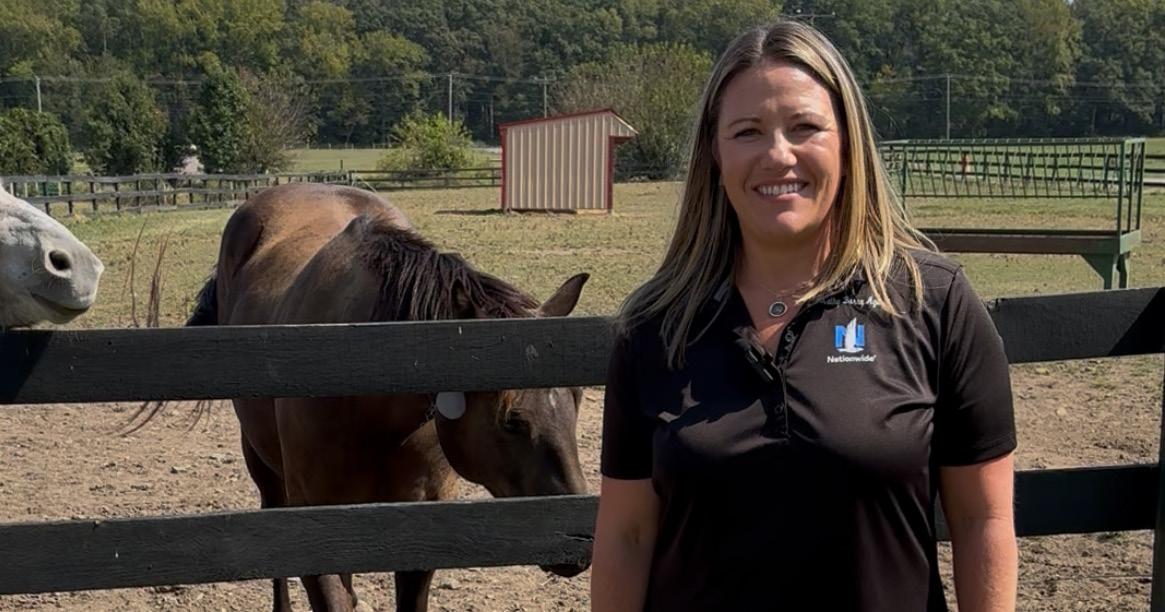



In 2023, 19% of deaths in off-highway vehicle (OHV) accidents were children under 16, with only 2% wearing helmets.1 This alarming statistic prompted Nationwide to launch the Let’s Champion Rider Safety® campaign, providing tips and resources for effective safety discussions and protection for young riders.
